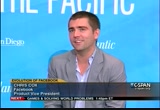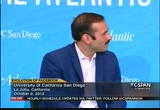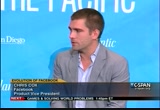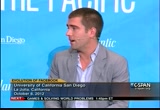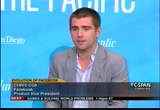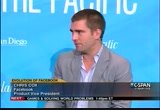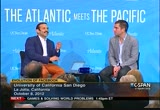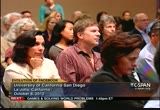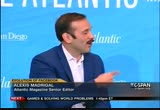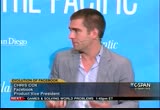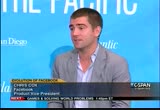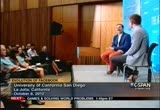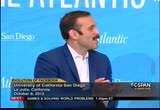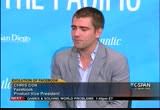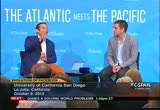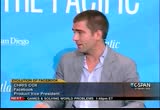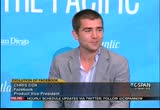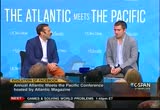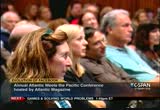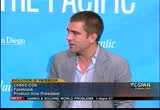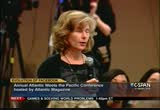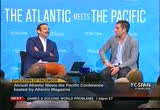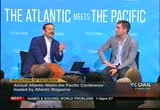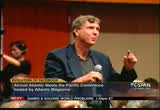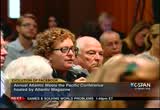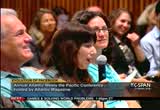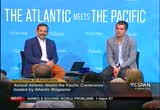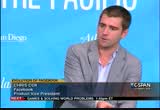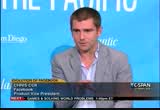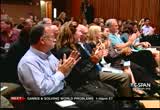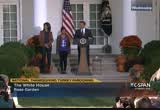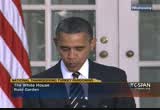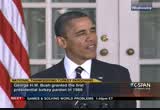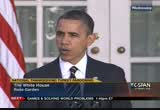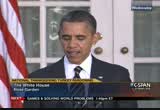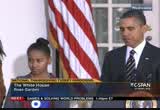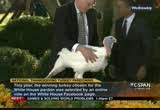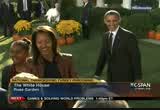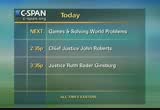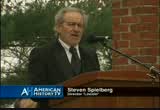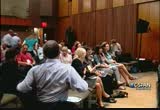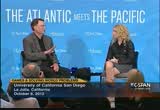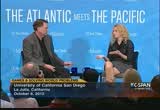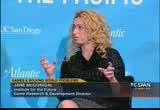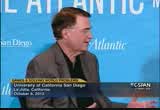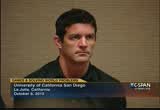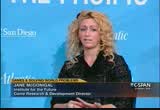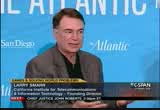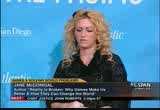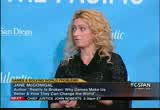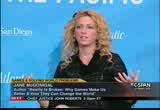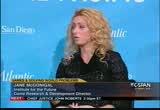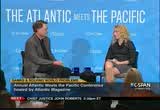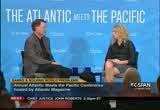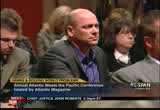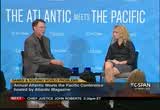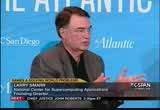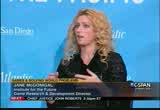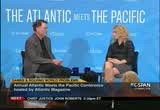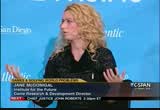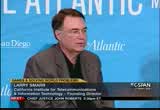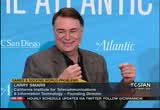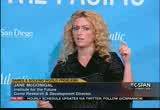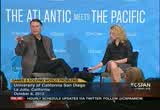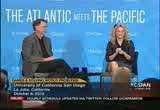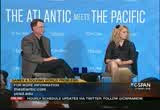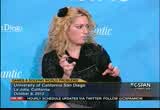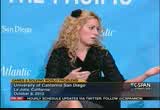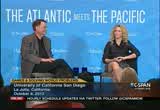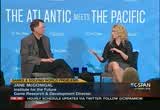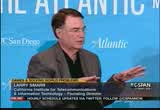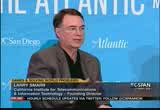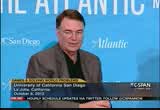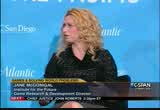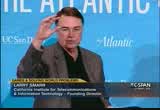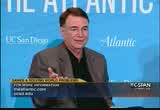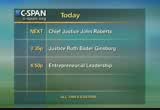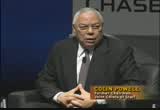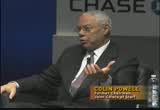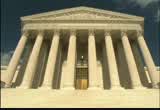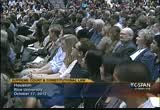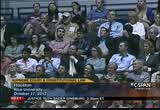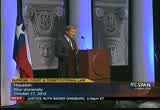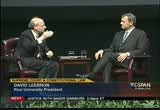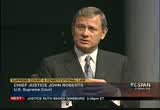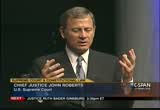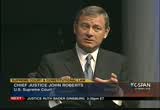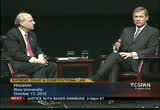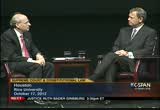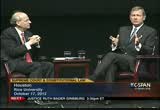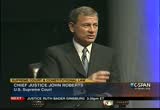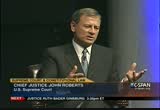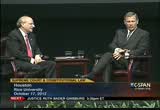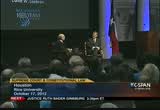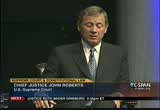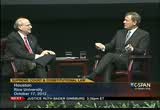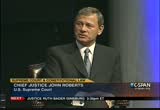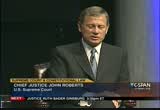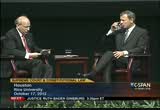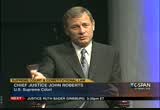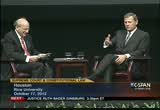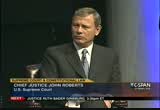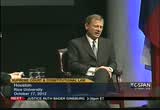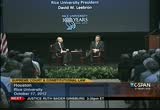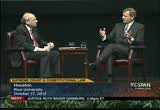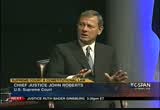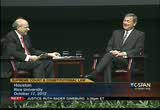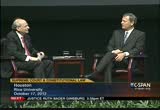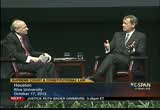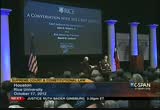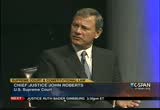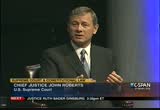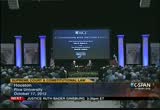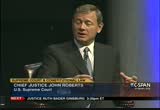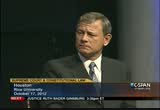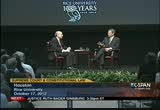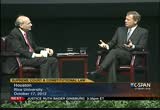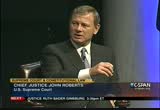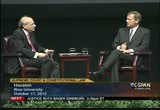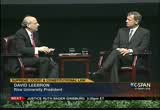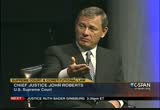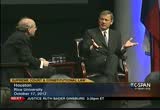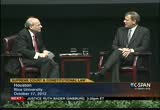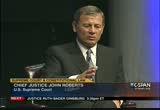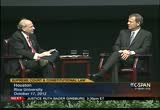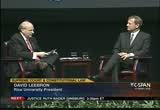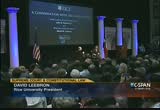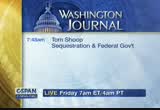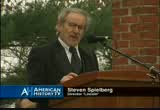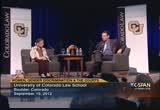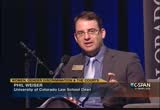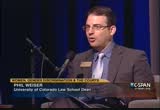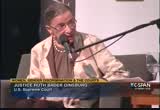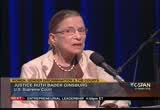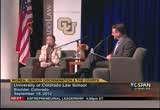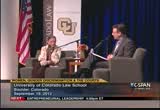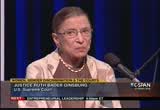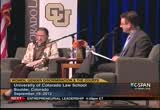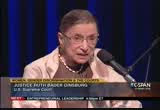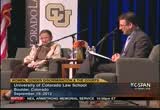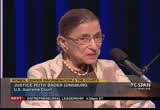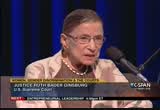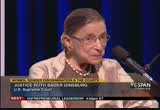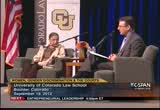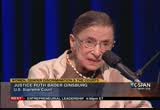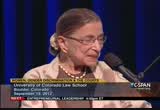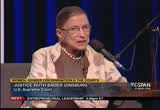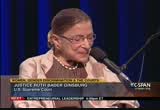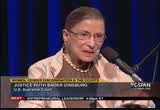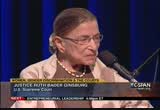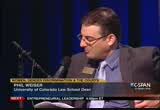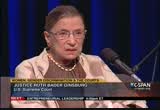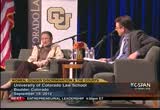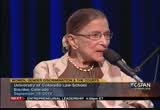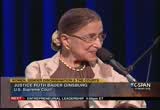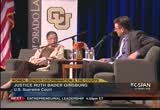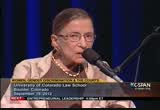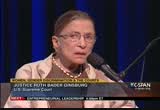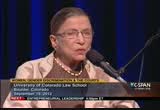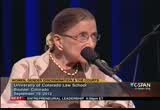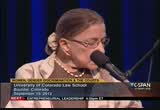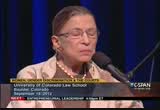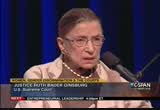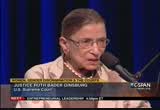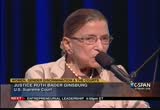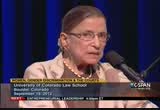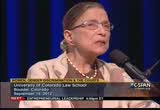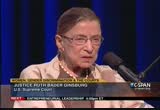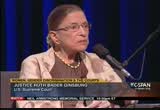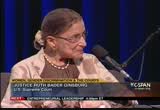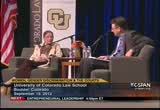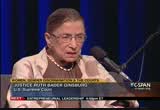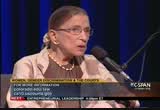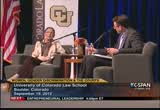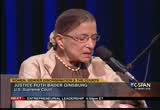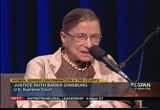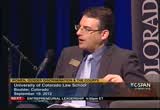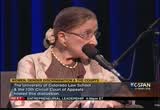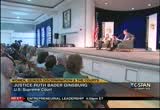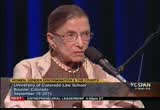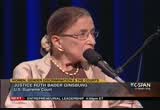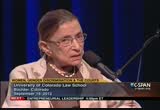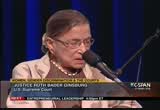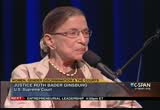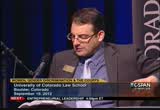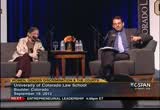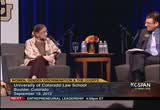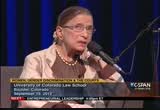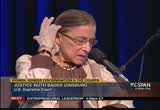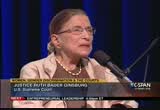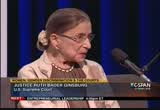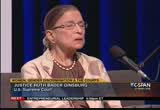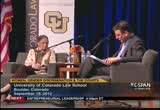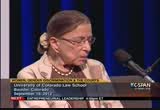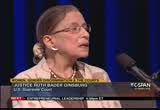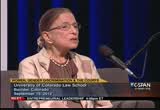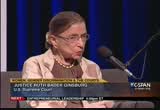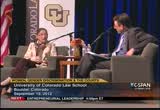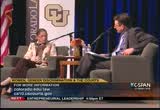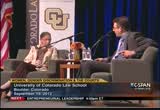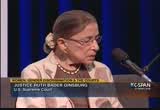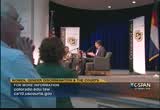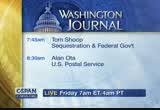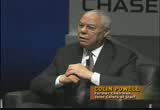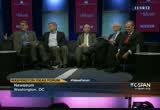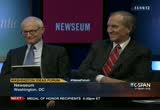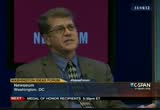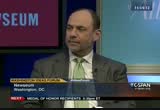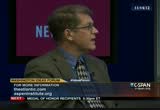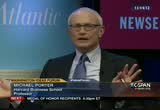tv Public Affairs CSPAN November 22, 2012 1:00pm-5:00pm EST
1:00 pm
we looked at those and said those are reasonable but if you look at the way people are behaving, you saw much more interesting ask, i want tos ee what's -- to see what is going on with the people around me. i click in to see if anything has changed. we use a behavioral analysis when trying to determine what product will be successful rather than a vote. >> what about the elected representatives? this is like the world's largest agglomeration. some have elected bodies of people. something the gives the user is a vote. >> it is an interesting idea.
1:01 pm
>> that means no. [laughter] if you go back now and look at what mark zuckerberg was saying, he was open with the idea that the wanted everyone in the world to be an facebook. what is the thing that now you are completely open about the ambition but it happens in three years or two years or five years, we're going to be like, what got word that -- where did that come from? >> mark talks about categories transformer to be influenced by social media. you are seeing that with news
1:02 pm
and more with -- the way that people this cover and -- news coming from social media. >> how many people here get their news from social media? i do. you kind of get your news from social media. >> if you think about what is happening in categories, there is commerce and travel and shopping. these are right now one player games. if you think about your going and deciding where you're going to stay on your trip to bangkok, you are interacting with a collection of documents written by relatively anonymous people. the same is true in deciding where to eat, finding a pair of jeans, and a lot of decisions you make when you're online.
1:03 pm
we'll see the way the world is going, we will make more of those decisions with a computer in front of us. which hotel to stay at, where to eat. maybe one day who to vote for on proposition 21. we look at that as an opportunity to turn it into a multiplayer experience and not just facebook but the ecosystem of social media and developers. you can imagine that the travel experience of designing a trip to bangkok is one that is influenced by where your friend has stayed, i bet you will have dos and don'ts, a great place and a beach you thought was beautiful and the temple you would have avoided because the line was long and a piece of it like she might have for a traveler. all that stuff israel. if you had a phone with you, you could press a button and legal little trail there. when you showed up you could see that this is what people had done.
1:04 pm
that starts to be a compelling way of thinking how computers cancer to be more of a conduit of the lenses of your friends in the people you trust and anybody in the world rather than an internet connection with a screen on top of it. >> won the presuppositions of that is that you need a persistent identity that is attached to every person in your life. that has a memory. this thing has to be searchable and be in place over all the times in troops and things. -- and trips and things. do you see that identity or are you replicating something that is occurring in the real world? >> so phones are something you have with you all the time.
1:05 pm
you only have one phone and you do not share with people. your the one person who uses your phone unless you are sharing some 1's photograph. it contains all your information. the applications you use. facebook, we think about it as an opportunity to connect. if you're having a fallen and a tabloid -- tablets and you have hundreds of applications and it will have lots of content behind them. facebook has become this that led to transport that this is my friend or let this person's music or this is -- is set of transporting this, to provide a continuous experience on your behalf. with that caveat that if you want to log out you always can. >> one of the concerns i hear from people is their kids are
1:06 pm
doing things now there are going to be attached to them over the long haul. in the past you are 19, maybe there is a couple of polaroid's plan around. you are able to move on from that period of your life. could you build forgetting and to freeze production? -- into facebook? >> you could change something that each person was in control of the representation people put on their profile. one of the unique thing was privacy controls. that was only possible if you had a system that knew who people where. you can amend the way you portrait yourself.
1:07 pm
what facebook has provided as a set of tools that people -- let people ramiya. -- remediate. on the small side, someone posts a picture of you and you want them to put it down. facebook is designed to like a billion person conflict resolution machine. diminishes the current work they do but it also has of these other features in terms
1:08 pm
of getting people back to the person they're having a dispute with. give them some numbers because the scale of it is like ridiculous. there are 7 billion photos of bloated every week. we are dumping massive amounts of published content. the internet in the 1990's, were trying to imagine it, it was like these web pages and it would -- a new web page would get treated and a few hundred or thousand would get at it but it has been exploded. if you think about instagram and the ecosystem of services where hundreds of millions of
1:09 pm
people a day are writing the internet. it's not like some are creating it and others are checking this out. it is these tiny bits of, 10 -- content. a lot of people would write us a letter. dear facebook, i don't like this photo because i look kind of chubby. >> it was a pretty bad picture. >> the tool, you can report a photo. it wasn't supporting this case. it wasn't this is illegal or
1:10 pm
misleading, it was this is embarrassing. a group at the university of berkeley studies the language of compassion and comes up with the best tools to help people mediate a problem and directs the message to the person that posted the photo. what started happening is this really cool thing which is people started resolving their problems together. the publisher gets the feedback. it would be one thing -- you should think more about this. we were able to build a set of tools so people can result of -- reside quickly. >> you're getting hundreds of
1:11 pm
movements like this. >> i do not know the number. >> this is smart to have tools. people often times when they are suicidal, making me feel down and suicidal. let's say you feed that. how did you do with that as a friend of someone who is saying these things. we developed a process. it will be thousands of people will get help. because of the scale of the thing. facebook is like an american company.
1:12 pm
do you feel like there's some set of values that are embedded? the mission of the company is a more open world. which sounds american free speechy. >> top the -- to the extent that this could be argued, you can put a message in a container and send it to whoever you want and that is something you should have the ability to do, unfettered. that is something that communication technology has made faster, easier, and cheaper since the beginning of time. one way of looking at facebook is one more step in the process of making communication from what is in your head to what is in line. periphery in high resolution. quickly. that is what facebook is doing.
1:13 pm
we view ourselves of the highest level. the users and the product is international. we bought tools so facebook is available in different language countries. and in most island languages that are available to the internet. how to use the word like. the process of tranalsting. this is a tool that has gone above and beyond the united states and that is something we should be 6 bided -- supporters of an excited about. >> twitter works like everything goes out there and it
1:14 pm
is a -- everything that people post, it is there. those were your free book looks like. facebook has the sort of model. maybe you can describe how that set of filters work. >> the basic problem is there is more content created every day by the people around you. it is growing quickly because we of cameras and we're sharing more and more stuff. and people are connecting to more than just their friends, they're suggesting -- they're committing to these individuals. each person has all these channels that are publishing stuff of everyday and i have a fixed format. maybe they are on an iphone or dan android pc.
1:15 pm
you want to give each person the best possible handful of pieces of content for them at that time. that is a growing problem. it is during free quickly and we believe it is important to solve. there is a bunch of machine learning, a bunch of infrastructure to assemble for each person. one thing i think about this is your publishing for each of $1 billion ever met. there is a model that tries to project is most likely to get air active with optimizing -- news feed optimizes what they would like to interact with. what will create a consumer of between the publisher and consumer? that is the high level.
1:16 pm
>> you think about how that system works for. lettis positive feedback. you'll get more of that thing. how do you tweak the algorithms so people ill don't show up -- it is a personalized newspaper. how do you now the difference between how they interact. people want to have both interactive, one more often but they want to see the other one and check it out occasionally. >> the main thing we rely on there is people. one of your friends posts the article. and some of your -- there are people who are posting articles
1:17 pm
about a particular thing, they're people who are noisy and do not speak very often. there are people who are domain experts in. to hear things and sure a lot of music. there are people who only share photos of their children. for their cat. one of the things we do is preserve a balance so you're not just seeing one person or thing. that goes along with what people tend to enjoy and address with. there is a little bit of diversity and a little bit of a coin flip. >> how would you like to sit at the controls knowing that you will find out? is an incredible supervision.
1:18 pm
1:19 pm
we waited for the positive emails to come in and i think i got one from my mom. we tried to understand what was going on and we talked to everybody. when you ask how it feels, that is how it feels. if you walk outside the door. it is not just this big numberis knowing that everybody in life is on your side. to give some doubt it -- and failed. could be built. it was easy as putting -- pulling a fall in output of your pocket.
1:20 pm
we -- when we watched people use it, what the hot -- people were using it a lot. and it will wait for two or three weeks and the e-mail is gone and we will we killing mailing headlines like ms. feehan, were graced finger while -- this is the greatest thing. you go back and look at the first radio and everyone said this will invade our privacy. they will call and i am not home and it will break into my house. telephones are probably good on balance caller id.
1:21 pm
massive forget when caller id came along. you look at the net in 1994. this is what the internet is. sandra bullock wakes up and types her name enter the internet. she -- when she wakes up she has lost all her bearings and were given the message that this was internet. i think it is prove that we're
1:22 pm
not very good at understanding when it comes along what is going to be eminently valuable and what is a reaction to something that is different from the world we're used to living away. questions. we have 40 minutes. right there. if you'd like to give your name that would be wonderful. >> my question pertains to the impact of facebook on democracy. i am concerned vis-a-vis the fact that rogue government is sources.
1:23 pm
are there people who help keep facebook at running? i am figuring out how it can be effective in countries that are closed with their communication. i am not a spy. tell us. energy making sure facebook is available. we spend a ton of time on infrastructure and hiring people to make sure that you can get to that news feed. when it comes to governments -- there is not a lot we can do.
1:24 pm
it is interesting that young people -- i had a friend who people use technology. one of the things he observed is the way he put it is the average 18-year-old knows every last detail of how bluetooth works on their phone, all the internet and facebook, the ins and outs of twitter, how to change your can message you. every last detail their understood. when he asked them to are you afraid of the government finding it, they would say they do not understand how this stuff works. it was a message that -- in places where people do need an outlet or way of communicating that is not necessarily available in the public domain. animal. >> we have written about this
1:25 pm
issue on the security side. one of the worst things that happened, people log in and the government puts middleware in their password. if you do that that is the issue are wrecking their servers so they have a lot of resources behind stopping that from happening. you know how often times they used to be like http:// and now it is https:// and that has to helping you out. another thing with hackers. the biggest breaches tend to be,
1:26 pm
there is a pizza place that sitting on a box. whoever ordered a pizza, a bunch of hackers got into it and it was 50,000 credit cards go down and that has happened many times systems. crucial data. >> i was curious around this concept if you had a discussion around the muslim video that came out, did you have conversation if that happened in a facebook context and if you think about this super country aspect that you are providing and what the effects are going to be and what the
1:27 pm
short-term things are compared to salman happening? >> i think of that video as a product of the internet. going on. the fact that i do not think it was a spontaneous thing. you had that video get translated and move within the social circles in the world. it. you could have that like a regular news station and it would have had more effect. >> i was wondering if you could facebook. you said it was free but a billion people, that represents a lot of disposable income.
1:28 pm
that is going? >> the primary wave facebook is monetizing is advertising. we want to provide free service. 1 billion people represents a lot of costs to keep everything up and running. advertising is the natural distribution company. medium. an advertiser can pay to promote wherever it is, whenever the message is they want to sen. the very highest level that facebook can be is a better solution for advertising. it will be easier for the ad to care brought to reach you then are. onthey're interesting takes monetize. other which would go to lots
1:29 pm
of people so they started to create ability. >> i'm curious about the thought process that goes into coming up with the next evolution of facebook. what were the gestations to come up with that is feeding and how many brains -- >> you're right. i think like that. and then you gave birth and no one like the baby. after a while people get used to their kids enjoy in them.
1:30 pm
moving on from that process, evolution? how many brains go into it? and then when you think far advanced, do you take on an outsider's considerations? i am thinking of a generation of kids whose parents think they waste more time on facebook. is there any way of thinking educational systems? encouraging kids to facebook in a creative way. making a microcosm, something that may have a more positive predictive outcome from an educational standpoint. >> would love that. their. >> what kind of communication do you have?
1:31 pm
where would you go with that? >> we have watched the nascent -- product called communities. it makes sure that only students group. it is a mega group that allows courses. a class. that was really hard in two dozen 3 to find someone in your anthropology class that lives near you that you could study with and that bit of value multiplied by a billion, it turns out so much of the learning process is people learn less. we do things that are broadly useful like that and can be launched and have a girder of utility, only cornell students can use this and you can create
1:32 pm
some groups in cornell for your team and classes or whatever. that. >> the other answer is also that they have an ecosystem of companies that are building on top of facebook and it seems likely to be felt by an outside company that takes that infrastructure and does something interesting with it. last question in the back. >> with respect to instagram, vision that pinterest has for itself? >> we saw instagram as being a compliment for facebook. you could take your front door
1:33 pm
and put a filter on it and put it in your friend's news feed. the utility was so tied up in the utility of what facebook was doing with that it was a natural fit. we went to school with those loved facebook. we liked each other and we have a similar view from what like crazy. just a remarkably engaging product trade uc their numbers, they're the same. pinterest is used building -- offers. line. loughs have collected over time. partner going into the future. there is going to be a bunch of things like that in the best we can do is provide a world where you get to do exactly what you want and facebook is to the extent to want to share it or
1:34 pm
1:35 pm
, obamacare he pardoned the national the 2012 national? giving turkey cobbler, and his ultimate cobbler were raised on the farm of crate and nancy miller near harrisonburg, virginia. this is the first time the winner of the white house part and was selected online from the white house facebook page. this is about 10 minutes. >> ladies and gentlemen, the president of the united states. [applause] >> good afternoon, everybody.
1:36 pm
they say that life is all about second chances. this november, i could not agree more. [laughter] in the spirit of the season, i have one more gift to give that goes to a pair of turkey's named cobbler and gobbler. the american people have spoken. these birds are moving forward. [laughter] i joke, but for the first time in our history, the winners of the white house turkey pardoned were chosen to a highly competitive on-line vote. -- chosen by a highly competitive on-line vote. once again, and eight silver
1:37 pm
nail that. he is amazing. -- nate silver nailed it. he is amazing. i want to thank everyone who participated in the election. are winning turkey can thank his stellar campaign team. here is steve. [applause] and as always, if for some reason cobbler cannot fulfil his duties as the official white house turkey, gobbler will be waiting in the wings. [applause] from here, these two lucky birds will be swept up in a whirlwind of fame and fortune that will ultimately lead them to mount
1:38 pm
vernon, where they will spend their twilight years in the home of george washington. later today, michelle, malia, sasha and i will be taking two turkey's the were not so lucky to a local food bank here in washington, d.c. i would like to ask every american to do what they can to help families who are in need of a real thanksgiving this year. tomorrow, in the company of friends and loved ones, we will celebrate a uniquely american holiday. it is a chance for us to spend time with the people that we care about, and to give thanks for the blessings that we enjoy, and to think about how lucky we are to live in the greatest nation on earth. it is also a time to remember those who are less fortunate. this year, that is particularly true for our neighbors in the northeast to have lost their
1:39 pm
homes and possessions and even their loved ones to retain sandy. -- hurricane sandy. in the past few weeks, i have visited new jersey and new york. i have seen neighbors -- neighborhoods reduced to rubble. i have yet to find a broken spirit. countless stories of courage and compassion have emerged in the aftermath of the storm. the one that comes to my today is about a tree on staten island. it is a giant blue spruce that came crashing down on the front yard of a joseph, whose home flooded during the hurricane. if you go to history today, you'll see a lot of damage and debris scattered all over the block. you also see the top of that tree standing tall in front of his house, decorated with ornaments that survived the storm, along with anything else his neighbors could fight, including empty cups and safety goggles -- a fight, including
1:40 pm
empty cups and safety goggles. -- find, including empty cups and safety goggles. it is a christmas tree. we give thanks not only for the things we have and the people we love, but for the spirit that sees as through the toughest times and holds as together as one american family, guided along our journey by the help of a better day. i hope that over this holiday weekend, we're alcee think -- also think about our extraordinary men and women overseas to are serving far away from home, in harm's way. the reason they are there is because they give thanks, too, for the extraordinary life we have here in the united states of america. may god bless those brave men and women in uniform better away from their families this holiday season. may god bless the american people. may well have been very happy thanksgiving. with that, i think you're going
1:41 pm
1:43 pm
[applause] up next on c-span, to experts talk about using computer games to solve world problems such as cancer, poverty, and climate change. the nation's highest judge, chief justice john roberts, talks about challenges to the constitution. he is followed by justice ruth a bitter ginsburg on gender discrimination cases.
1:44 pm
-- justice ruth bader ginsburg on gender discrimination cases. >> friday morning on fox "washington journal," tom shoop discusses the sequestration. ta on theall alan od u.s. postal service. and look at consumer confidence, with washington post financial reporter dan neal douglas. your phone calls, females, and tweets. "washington journal" live friday mroning on c-span. >> the name of this place still rests -- resonates with the shuttering of the american people. more than any other name connected to the civil war except lincoln's, a gettysburg reverberates. americans retain knowledge that what happened here was the crux
1:45 pm
of our terrible national trial. even americans who were not sure precisely what happened on these fields know that all the glory and all the tragedy we associate with the civil war besides most probably, most indelibly here. >> denied o'clock eastern, lincoln director steven spielberg -- at 8:00 eastern, "lincoln" director, steven spielberg. >> now we bring you a discussion about gaming and solving the world's problems through an alternate realities. analysts talk about the effect of gaming on health, education, and social issues, as well as the future of clout computing. this portion of the second annual "the atlantic meets the pacific" conference at the university of california-san diego is 50 minutes.
1:46 pm
>> we're going to switch into a future oriented talk. i worked with jane for years at the institute for the future and she is a phenomenon. i could not be happier to get a chance to talk with her in front of you and everybody else in webland. notion developed. >> i started working with the institute for the future. united states. a lot of what we do is look at the technologies and figure out in the future. i had done live ph.d. at berkeley looking at gamers and do in real life.
1:47 pm
all the communities who would play their games and get all these great skills and look for a juicy problem in the real world that would let them use their skills. and there were none. what i started to do was look for ways you could create experiences that let people use their skills to solve problems. games are helping scientists have to cure cancer and they're working on climate change, everything you can imagine. >> i do not think people world
1:48 pm
is. when chris was saying 1 billion photos were applauded every week, that is amazing. tell us about how big this grown to. >> there are more than 1 billion worldwide his spend an hour a day playing a game on a network mobile home -- mobile phone. >> how many are in this room? >> all those angry birds hours count. [laughter] >> three. representative. we are not experienced with? >> we know one in four gamers is 50 or odler. -- older.
1:49 pm
it is 13 hours a week for boys and eight hours for girls. the last decade. we still have a gender divide. now it is 94% of gross are giving regularly, getting the same proficiency with technology, the same social gaming. >> i can remember 25 years ago that my two boys who are now 30, we needed to get them engaged with games because it was born to be important for their future and bring development. if you sit in class and you're lucky if that teacher calls on
1:50 pm
you to answer once a day, whereas if you are in -- making times an hour. that is what drives neural development in your brain. my guess is that these kids have physically different wired brains than the older of us. >> that is one thing i got into is a neuroscience of gaming. a couple of interesting points that we know about games from what researchers are putting on at figuring out. feeling -- failing. educational research -- the sweet spot for learning difficult material is to be able to fill 50% of the time because it exposes the gaps between what know.
1:51 pm
to realize that we have this world of gaming where gamers are allowed to fail and have to fill most of the time does not allow them to progress toward higher levels of proficiency and ability. we also know that the average young person is right to spend by 21. if you look at middle school and high school attendance, that is with perfect attendance. classroom. learning to be a good gamer. >> it is interesting that failing early and often is what you want people to do when your prototyping so those are really great skills. i am sure people are thinking that is a terrible statistic.
1:52 pm
i'm sure you get this lot. >> i did not come into this thinking i would become an evangelist for gaming. i was interested because i was seeing gamers who were frustrated in their real lives life. i did not start out thinking i would tell parents or educators or doctors, more games. everything we see about games is pretty great within reason. service announcement. everything i will say is true if you follow a few rules. one is adults have to game less than 30 hours and kids have to game less than 21 hours. looking at huge populations globally, when you cross those numbers, the benefits to do start to go away. consequences.
1:53 pm
keep it under that. you should be spending 50% of her time playing with people you know in real life. you can get home alone connected to your computer network but most of these benefits require their real community. that said, we know things like true of day -- even if they spend their time playing violent games. collaboration. adults. many trials will be trying to validate this showing that on- line games beat pharmaceuticals for treading anxiety and depression.
1:54 pm
30 minutes a day boosts positive emotions and stimulates the same reward system that pharmaceuticals are trying to through gaming. one reason my company is looking depression as well. >> that is amazing. things like world of four craft cannot talk about the scale ofit is unbelievable. >> interesting. you have lined the virtual world, you can collaborate with 100 people at the same time but what is interesting are the global communities. you have millions of people playing and they are using wikis and youtube tutorials. my favorite game is minecraft. if you have kids, they are probably planet.
1:55 pm
it is a teaching community. is basically as soon as you discover how to do something cool, you make a video and teach others how to do it. it is this peer to peer educational culture that is inspiring all the on-line educational systems. anybody trying to do the kind -- khan academy. >> i always felt that school was so isolating. the idea that you would have a creative act that hundreds would think is cool when you're in eighth grade and what that would do, it is not possible.
1:56 pm
the virtual world is vastly more capable of than the physical world can be. is trivial. >> what you mentioned about this idea that you could have creative agency and be validated as a crater is important -- create short now. all the most popular games have editors that you can make your own game content or the game is about creating. what is needed is that lines up gamers what. there has been industry research game? there are things like excitement and pride but the number one feeling is creative agency. the feeling they can try something and see the impact of it, to take a risk, to be seen as having of the creative power.
1:57 pm
that is in need that we do not always do a good job of facilitating when we send kids to school or up to work but the ability to create and be seen as having creative power is huge in gaming. abstract to people. one of the things if you have not seen jane's ted talk it is a masterpiece and you all should look at it. i wanted you to share from that changed your life. >> i had an interesting opportunity to put my theories and research to the test when i was writing my book. i was halfway through it. i hit my head and i got a concussion. i was -- did not heal properly. syndrome.
1:58 pm
30 days later i am still totally concussed, i can't rewrite or member people's names. my doctor told me that the most important thing was resting the brand, not to do anything that was dripping the symptoms and although i was anxious and depressed, she said you have to try to be happy because the brain cannot heal in a state of severe anxiety and depression. you need to change the neurochemistry. cannot work. be happy. [laughter] i was halfway through this book about the positive emotions that connected socially. i was at a low point. i was dealing with one of the most common side effects of guesde's trying to --
1:59 pm
traumatic brain injury, dealing with thoughts of suicide. it was kind of this thank god moment, were had the mental clarity enough to think, this seems impossible but if you can make it a game, you can get through this. just try. besides the ted talk, here is the inside scoop. i put videos up while i was still brain injured, tried to explain the idea that i was going to make a game out of this. it is a little bit hilarious in retrospect. struggling, and not like this of all. and you can go back and see me try to design the game in real time. it did not make hardly any sense. the more i sort of put it together, using the idea of class, something you could do every day to feel productive, get the reward circuits going. power ups.
2:00 pm
games are always tried to collect our reps. you look for the games you can do that make you feel happy or productive. for me, just getting out of bed and walking around the block once. and you would battle the bad guys, for me, i had to avoid things that would trigger my symptoms. i needed to try them. try to read, where it goes. read for three minutes. keep battling and tell you one. -- won. recruiting allies. for me, it was easier to reach out to friends and family and say, i am playing a game to kill my brain. i want you to play it with me. that but was better than saying i am really depressed. i know i hit my head and you not. we do not like to feel vulnerable or ask for help, but i use the game to us for help. -- to ask for help. for me it worked on the purpose
2:01 pm
every day. it took more than a year, but the game stopped the suicidal ideation immediately and really work on anxiety, so i posted about this online, and people started using it for dealing with chronic pain, insomnia, cancer, everything you can think of, and based on people playing the game, to improve their social relationships, to get a better support, and to improve their own anxiety over a dramatic illness or injury, we home thought of making an app. is free. around mental health challenges, but it has been quite a journey. that was three r -- three years
2:02 pm
ago, and we wound up being able to use the theory about games to try to help people with enormous health challenges. >> mental health is a tremendous will problem in this country, and i think this feeling of being alone is a big part of it, and the idea that you can get out of create your brain and create this encouragement world, this world you can work in that is separate from the physical world you feel trapped in, i think that is an that or important step forward, so how have you turned this into a super best lab. >> it is super better. the sequel will be super best. thank you. you talk about getting outside
2:03 pm
of yourself. this is like a multi player game. you sign up for a challenge, but you invite friends and family, and you can recruit allies, maybe someone who has been there before and what sued mentor you. one thing we found is fascinating we have 125,000 players. we have more than 50% acceptance rate when you invite somebody to play, which side is very high. you are lucky to get more than 100 people, and these allies people, suggesting a class, giving them positive feedback, and i think what we are discovering is there is a they have tremendous desire to help others. we are seeing that in the
2:04 pm
commercial game industry. it anypeople see games as competitive, but three of the four gaming hours are spent in cooperative game play. people want to help, so we are seeing that in super better 2. maybe this is a platform that would actually help the health of anybody volunteering to be an allied because it increases your sense of meaning and purpose in connection. >> we have heard about social entrepreneurship, and this is taking it to the basic human social involvement, namely individuals, that you do not have to solve a big crisis in the rain forest. you can help somebody get through a really difficult time. >> this is the big thing.
2:05 pm
it is something we have been grappling with. a great opportunity of network culture is to find little things for ordinary people to do, and crowd sourcing is a huge success in some areas, but it seems to bill me there is a much bigger opportunity to unleash our all compassion, our humanity, not just improving artificial intelligence, but also what is the smartest thing to help somebody else feel less alone or more optimistic about a challenge? not all people have explored this yet. think about wikipedia. the unit of contribution is one side. -- fact. what is a unit of contribution to help someone who is having a hard time? we are trying to build back.
2:06 pm
>> this is like what we said in the 1960's about spreading random acts of kindness. now you can do it now on a large scale. >> it is not going to be random anymore. >> one of the things i think this is going to intersect with is mobile health. we are going to have a great panel at 1:15 on mobile health, and mark will interview tomorrow. what is happening is all this data as individuals about the state of our body is coming out on the web. you can choose to share it, so it is an enormous amount of data that software can be applied to and in particular, software of games, so there is going to be an intersecting
2:07 pm
trend to where we get an indication for these challenges that will have an impact. >> there are so many great experiments. first, people collect the data, and people are not always interested in that. there is a great project where they used game mechanics to get people to report air quality data and also uses of inhalers like putting a gps monitor on an inhaler so you can see where people are having asthma attacks, and they use game mechanics to make people more willing to participate. they made it a community, made it fun, so people have to collect the data for this to
2:08 pm
work but also to make sense of it. a lot of people are interested in game mechanics for behavioral change. once you see the data, what are you going to do about it? we know games are great for giving people concrete questions that can be relevant to your skill level, to your resources available, and i think it will be so much easier instead of just telling somebody, you have to lose weight. you have to exercise more. we are going to live your phone and see that you have not texted or call any one in 48 hours. we know you need to do that, so we can tell if you have not left your house today and you are depressed. >> this is going to revolutionize our lives as humans. this next big thing we are going to have is a motion tracking. everyone is going around like
2:09 pm
this all day long, but there is the camera looking at your face all day long, and we have a perception lab, and they have shown that just by reading the muscles on the face, you can tell the mental state, emotional state of the person, even the pain level in kids were you try to make sure you do not over medicate them. they cannot tell you what their pain is, but this thing can. imagine this thing is reading your face all the time. there are digital signal processors in the phone that are powerful enough to be essentially making a diary of your mood and comparing it, so what fraction of the day are you smiling compared to a week, a month?
2:10 pm
these are incredibly useful indicators to not just mental- health, but so much of that is actually biochemical. serotonin, dopamine levels have a lot to do with whether you are depressed or happy, so this is deep insight into the person. imagine the more data there is, the more artificial intelligence can do a good job of coming up with a predictor that is useful. >> game designers like me get excited about designing intervention. if you are looking at the screen, one of the metrics we use is a three to one ratio common so some of you -- 321 ratio, so you have to get your positive to negative ratio of 3: 1 in order to achieve a lot
2:11 pm
of health benefits, social benefits, people like you more and want to help you. if you are alone and not read: 1, you want to actively intervene, and game developers can develop all kinds of interventions. playing angry birds for 30 seconds can help. my favorite is looking at pictures of baby animals. research came out of japan further validating this. the internet has never been happier. it does have a lasting effect. you can look at a picture of a baby animals for 30 seconds and be more productive because your attention is sharpened, you have a positive the motion of driving your activity. game designers can come up with a million things for you to do once the system recognizes the need that.
2:12 pm
>> the other thing i found fantastic in your peptalk -- this seems abstract, but the idea that you are linked in your life and the productive quality of those extra years by these kinds of behavior changes and feedback. can you talk a little bit about that? >> after i went through that experience with a brain injury i was really curious about one thing seemed to help -- what things seem to help like a five minute walk or baby animals, and i started to learn about resilience research. i learned there are four areas of resilience that contribute to high quality of life. it is physically, which means you need to disrupt sedentary lifestyle. i think we need to hack
2:13 pm
conferences like this, because it is too much sitting. you should never sit more than an hour at a time. i will teach you one d coulter thing that will help us. -- one geek culture things that will help us. one of my favorite terms is italian for pride when you overcome an obstacle. it is a signature to gamer in motion because you spend 80% of your time failing, and when you win you feel like you've earned it. this is something everyone has the same physical expression. you see it in soccer players after they make a go. -- goal. what we should do, everybody should think of something hard they have done in their lives. we should do this together because not only will it feel awesome, it will help us live longer. think of something you did, and you feel so inspired you are
2:14 pm
going to jump out of your chair. what do you want to think about? see you have something? >> i am good. >> ready? one, two, three. to that during every talk. they will think they are getting a standing ovation. they will be very excited. >> this is serious science, and the ability to make these choices, to get up and move, is not just eating vegetables, which would also be a good idea, but the emotional state, having more positive emotion. positive emotion is chemicals and in your bloodstream, and they have a cascade of other hormonal changes you inducing your body, so this is for real,
2:15 pm
so the idea you could have this virtual universe available on different platforms but with gaming turned into essentially your personal growth coach and your personal assistant and everyone of us has one that is customized to our lives, our numbers, our needs, and only the web can do this. only having a planetary computer -- the big things like amazon, google earth, these folks are adding like a million cores a year. i do not think anyone has any idea how bad this is said it continues to escalate, so the ability to have that power on you, that is a world we have
2:16 pm
never been in before. >> the key thing about emotional resilience is it does not matter where the emotions come from. i have been doing this work for more than a decade, and one of the most confounding critiques the fields listed in it, i have been struggling is whether it is legitimate or not. what happens in games is not real, so even if we feel good company and we will leave the game -- it is not a real achievement. it does not really move us forward in our lives, so it does not count, but now we know from research on positive emotions that it does not matter where you get these sources of promotions, so that is why you see all these studies of games and improving longevity, declining demand share, in approving relationships between parents and kids.
2:17 pm
new -- declining dimensia, improving relationships between parents and kids. they have done studies with kids in hospitals. they can lower their anxiety. you can help posttraumatic stress disorder just by having somebody play a game like temptress-- tetris 24 hours after an event. there are so many interactions we have i think we can put aside this idea that what happens in the game stays in the game. >> if you think there is reality, it is all in your brain. your visual cortex is working with your auditory cortex to create what you think is reality. there may be one, but what we have in our brains is as virtual as what is on the web. let's open it to questions.
2:18 pm
we have mike. >> good afternoon. i am ted walter from the san diego zoo, and i have lots of pictures of baby animals, and you can spend 30 seconds or more. we have a live camera on our baby panda, and you can get that through a free app, not that i want to promote that. it seems like is good for your help. -- health. i am most interested in trying to find ways to preserve wildlife. i was really intrigued by the concept. how would somebody like me or my organization go about constructing a game like this to get people involved in a solution so we are not alone in this planet? where would we start? >> i set up a zoo with some game developers a couple years ago, so this works that you can
2:19 pm
do this. there is an organization to curate examples and also help matchmaker between organizations and developers, and within that group as a social network are foundered -- i founded. people think gamers' are playful, and they are not. gamers are so serious and goal oriented and strategic and take it seriously. in many ways it does not feel playful at all, so i refuse to use that word. it is a social network for people to find each other, so that is a good place to start. for anyone thinking, how do i get involved, if you do a web
2:20 pm
search for games for zoo, climate change -- i think we could play a game right now where you could give me five things and there would be a case example for every single. search for the most random thing, and there should been a case id, and people are very generous in helping out, especially university students. all the time i get organizations to recruit, so there are so many young people interested in games for good. >> i have a development background. i used to be with the world bank. my question is the you think games can be used to help people deal with abstract concepts?
2:21 pm
we find there are views that poverty is a state of mind, and when you listen to suzy ormond talk about financial literacy, you see there is an emotional content into financial problems, and the argument is people who are perpetually in financial trouble are having trouble dealing with emotional relationship with money, so my question to you is you think games can be used to help people deal with that emotional relationship with what is basically an abstract concept? >> yes, there are so many examples where people are looking at games with poverty and games of money. one of my favorite examples was a group out of new york city called the area code. if you are looking at lots of examples of creative solutions
2:22 pm
to problems, is one to look at. they did a game around money where communities in the south that have high rates of mortgage defaults, and low rates of savings, and they made up a currency called macon money. macon, georgia, so they had macon money. ads in dollar bills but all of them have been cut in half. they gave out all this money, but they were all half a dollar bill. the currency could be used in local stores in services like cash, but you had to find the other person with half of your bill, and they created a social gaming environment where you could meet up. if we met in a coffee shop we
2:23 pm
could use its air, and it created a social layer and physical community to transform the community and also bring positive of motions, that you have solved this problem and have success, and it is really interesting. basically, my answer is yes. there are so many crazy things you can thing to do with a game design that bring in positive emotions and physical environments around even really abstract questions. >> in the back. >> my question is there a gino type associated with gamers? is there anyone who has found a genetic profile? >> around to different types of
2:24 pm
games, yes. i thing. i will not pretend to understand exactly what genes are being expressed or how, but at the gender level, we know the boys tend to be more motivated by game environments where mastery is emphasized, certainly competitive environments, but even competition, whereas girls almost universally are spending time in environments where there is collaboration, exploration, discovery. that is interesting, because we start to do game designs for
2:25 pm
solving real world problems, and you have to think about how different types of people are drawn to different types of games and motivated differently, motivated through social solutions, and i am sure you could dig deeper and find actual variations in the code. >> we just need to do a matchup between your genetics and gamers. >> i was curious if you have any sponsors on -- thoughts on google now and is there going to be any changes around that? >> huge. one of the biggest next changes in the nature of the cloud is it is going to become much more intelligent. there was an article that came out yesterday about google using massive amounts of computing but also massive amounts of data to improve
2:26 pm
neural networks, and they said they are getting a 25% increase in voice recognition accuracy just doing that. this is one of the gift that keeps on giving, because of more computing it takes to support users, the more this capability grows, so i have said for some time, imagine there is a service that if you're building an app you can tap into that is intelligent, but has predictive capability, and there are all kinds of artificial intelligence methods, or other things that can take a advantage of this, but i think that is going to be like a laser that you build apps on top of the cloud. that is something you need to
2:27 pm
tap into. it gives a huge amount of things. imagine five years from now. siri 5.0. i think it will astonish you how intelligence this community becomes. watson was on a small set of computers. it is a lot of data for a human, but compared to a week, not much data. watson is going through the cloud, and they are putting in all the medical textbooks and things like, so this is one of the biggest trends i see coming in the cloud, for it to become much more intelligent and for you to have -- we use to talk about smart pets. i am more into virtual pets than literal.
2:28 pm
you do not have to clean of the litter box, but these things -- there are a lot of robots from japan's that have done this, but i think you are going to have multiple personalities for you in the cloud that become a part of you. we are going to have a split personality, and it will get stronger and better every day. in the back. >> i have two questions. can you recommend a game for those of us over 60 who have never played a game? second, the disconnect between physicality and sedentary nature of games, particularly if you are doing something 20 hours a week? >> i think mine craft is the
2:29 pm
coolest game to check out right now. you can play it on any computer, so that is an easy place to start, and what is great about it is it is kind of like lagos -- legos, where you build whatever you want, except imagine evil monsters to destroy whatever you tried to build. >> like brothers. >> there is all kinds of architecture and design, but you can also wander around and see what other people have built. new appreciate them. it is great, and it is really easy to get into. if you need an edge, go to ruth youtube and search for -- go to youtube and search for mindcraft.
2:30 pm
-- minecraft. there are a lot of tutorials. that is where i would begin. the physical nature is something games are working on. obviously we have these physical games like wii, which does a decent job but probably will not replace physical activity. what we are hoping is that it serve effectively as a gateway or springboards to physical activity. there is lots of research around self efficacy that happens in gaming, where if you have a successful experience, that it changes your perception or increases your likelihood of doing something physically active in the real world, particularly if you have an avatar in the game that looks
2:31 pm
like you, so it amplifies how often you are. stanford has the best research on that, so i think to think of the physical aspect of the game as being a gave way to real activity is important, and a lot of folks in the gaming industry are just reminding gamers' to stand up for the last 10 minutes of any game they are playing, because you can play almost any game standing of, and it is as important for those of us at a computer for more than 20 hours a week that we should be doing that, too. >> this question is going to become dated, because the virtual world is going to quickly overlay the physical world as we walk around. have any of you had a chance to try these google glasses? and they project the virtual
2:32 pm
world over the physical world. we will all be wearing them i presume in five years, and at that point, i think the world of gaming in our lives as we walk around and do things will fuse, and you are going to have been augmented reality that is vastly more informative than physical reality. i am looking at you, and i do not know your names. i do not know what you do, but that is crazy. we have that information on the web, and the information is enough to figure out who you are, and i can get the data and put it over your head. that is the kind of world we are going to be living in in just five years, and we will never go back, so that world is the
2:33 pm
sort of thing james has been talking about for years, and the ability to have the software and virtual world and physical world come together is going to make us all super heroes. >> if the world is as interesting, it should ameliorates the couch potato affect a little bit. there are always people who liked to sit around, but if we can get a little bit of physical activity into what we think of as sedentary now, hopefully we will get more people in the real world, where they can keep the game going. >> let's thank jane. [applause] >> coming up, john roberts talks
2:34 pm
about challenges to its constitution. then justice reese bladensburg, and business leaders and economists on oct. neural the ship and its impact on the u. s economy. friday morning, a discussion on the potential impact of fiscal cliff budget cuts on the federal work force. the future of the postal service, which has lost $16 billion in 2012. and a look at some point -- consumer confidence with danielle douglas.
2:35 pm
>> you've career officers change this army because it becomes a volunteer army. go find them in the villages and towns of america. we did that, and over five or six years we created a splendid force of young men and women who are willing to serve their country as volunteers, and they have the same tradition, culture, loyalty and dedication as any other generation of americans that have ever gone before. they proved themselves in the gulf war, the panama invasion, in the last 10 years in iraq and afghanistan. but the thing we have to keep in mind is something that president lincoln said in his second inaugural address -- care for those who have borne the battle, to care. that means never forget they are carrying the american spirit,
2:36 pm
the american traditions with them, and when they get injured, hurt, or when they come back to be reintegrated into society, we have to be willing to care for them, not just the federal government, the veterans administration, but fellow citizens. >> more about the treatment of returning veterans with colin powell and stanley mcchrystal to live on c-span at 8:00 eastern. after 9:30, talk about hollywood's impact on american culture. and then homage to neil armstrong, just before 11:00. a discussion with u.s. supreme court john roberts. he spoke at rice university in a houston about the challenges to the constitution and his favorite movie. rice university president david leebron introduced the chief justice and held a conversation with him.
2:37 pm
this is just under an hour. [applause] >> thank you very much. thank you, and thank you, david, for that gracious introduction, and for all of you for a very warm welcome. this is my first visit to rice, and i'm glad i have come. president leebron told you that i cannot talk about anything current, future, or past, so my remarks will be brief. [laughter] i have the pleasure of knowing david for 35 years. he was the president back then, too, of the harvard law review. we had -- we are used to holding the reins of power. a chief justice also holds the reins of power. the only difference is that a chief justice must hold them lightly, lest he discovered they
2:38 pm
are not allowed the -- attached to anything. nevertheless, i know some long and personal experience that david brings to rice, a special vision, telecom and leadership. this school is fortunate to have him at the helm, and i know he feels blessed to be here. i am pleased that they invited me to visit rice as part of the centennial celebration of the university's foundation, and i extend my sincere congratulations to the trustees, the faculty, students, and alumni on your first great century. the founding of a new university is always an historic occasion, but the founding ceremony for rice was truly extraordinary. i went back to read the newspaper accounts from october, 1912, that recorded the event. the papers reported that the
2:39 pm
distinguished first president of rice invited 150 pronounced scholars from around the world to attend the three-day founding celebration. the scholars donned academic robes and marched to the ceremony to the accompaniment of a ban. the president prepared and delivered an epic essay on his vision for the new institution. that essay fills 85 pages in print. there is no need to panic had for the excess. i do not intend to emulate the president in that respect. the newspapers reported that the formal invitation began on october 12, which president law that intentionally timed to coincide with columbus' arrival in america. he and high in his vision for the new school.
2:40 pm
he was not the first speaker. after an opening prayer, a princeton professor recited a lengthy poem, which he wrote for the ceremony. this poem, drawn from an indian legend, it evoked images of a wild bees, some stars, and frontier pioneers. the audience listening to the words the strictest attention, punctuated with frequent applause. the next speaker, the chief justice of texas, spoke in prose. his review was nowhere near as good as the poet received. in light of that, i thought the best course would be for me to compose a poem for this occasion. again, no need to panic or run for the exit. i gave up that plan when i could not find a suitable words that rhyme to with sui generis.
2:41 pm
president spoke third and delivered his speech. his essay is in fact a truly magnificent scholarly work. it prevents -- presents a methodical and prophetic vision of what the rice institute would become. i would like to focus on one point he made. he observed a great challenge in creating any institution is "to plant at one and the same time for the immediate future and for the next 100 years." we are now at the century mark, and it is a to say that the president and the six presidents who followed him to have met his challenge. range academic programs from space science to the institute for public policy, and they are marked by relevance and their ability. look at the graduates, rhodes scholars, astronauts, attorney
2:42 pm
general some of best-selling it offers. the diversity is truly amazing. rice has excelled in ways that even the president could not have guessed. in talking about rice's famous come-from-behind victory over heavily favored colorado in the 1938 cotton bowl. [laughter] [applause] it is at least famous in the halls of the supreme court picket until then, unbeaten colorado was led by justice brower chris byron white. despite the stellar offensive and defensive performance from white, which included a touchdown pass and extra points, the owls prevailed. not even president law that could have foreseen that. when he spoke of 100 years ago, the newspapers in this state and around the nation took due note that something big was
2:43 pm
happening in texas. the new york times reported that president love it had attracted an array of the learning such as had seldom been assembled in the united states. another paper waxed mystically and observed that the president's speech coincided with the early evening appearance of both jupiter and venus and suggested that the evening sky was an all glory of a bright future for the institute. not every newspaper was as perceptive or trance jed -- transcended. one local journal reported the founding of rice in the same column that the news that congo, the largest circus elephant, was coming to town. as i said i will keep my remarks a great great great deal shorter, but i would like to close with a personal word of congratulations to the president
2:44 pm
on having the privilege to serve at rice during its centennial. i am delighted to have the opportunity to call him president once again. any of you who have been to supreme court note that the justices on that court are used to asking lawyers a lot of question period today we will turn the tables a little bit and we will have a lawyer asked me a lot of questions. thanks very much. [applause] >> thank you so much, mr. chief justice. as i begin, we have people from all parts of our community, a lot of students here today, and among the students are quite a number who are to keep about going to law school. yet what they have been reading about is both a decline in the reputation of law schools, maybe even a decline in the reputation
2:45 pm
of lawyers, all that is hard to imagine. [laughter] questions about job prospects after law school, and i thought we would take this opportunity to hear your thoughts and reflections and made the advice for our students who are thinking about going to law school, what a career in law should be or how they should be thinking about the future of law, what the opportunities are. >> well, it is an obvious answer but when the people did not think. you have to ask yourself why do you want to get the law school? i think there are lot of people who go to law school because they are not good at math and cannot think of anything else to do. [laughter] they often turn out to be very disappointed lawyers. i suppose the better way to put the question is not to match what you want to go to law school, but why do you want to be a lawyer. you ought to do some serious
2:46 pm
soul-searching about that because it is always a difficult profession, but particularly these days. if you want to go to serve your committee, perhaps as a prosecutor, that is a good reason. there's something very gratifying that being able to stand up in court and saying you can speak for your country. same is true on the other side. maybe you feel motivated to represent the rights of those people who are accused. that is another good reason. when they announced a case in court, the bailiff will say this is a so and so people versus smith, district attorney will stay up, i am, so and so, i speak for the people. i have a friend who is a civil defense lawyer, and when it is his turn, he says i am so and so, i also speak for the people. just one at a time. perhaps you want to go to law
2:47 pm
school because you have a particular policy area you are interested in. you want to do what you can to promote environmental protection and you think that working through the law is the best way to do that. you have to have a reason. there are better things to do if you cannot think of something to do than embark on a particular career path. >> thank you. one deterrent to the court for a moment, a little bit on public perceptions. we read about the court and we read about decisions on the court, but the common description is there are conservatives and liberals on the court. there seems to be that categorization that in some sense is not the public's perception, but that be a perception. is there a way you like people to think about the justices of the court in those categories? i'm sure, i do not think it is an accurate way to do the court. it is important from the political branches in ways that
2:48 pm
do not make sense in a lump -- non-political branches. most of our work, you cannot identify a liberal or conservative view. we have a typical bankruptcy tasks case and nobody could say you are a liberal if you wanted to allow the deduction by the state or conservative if you want to require the debtors. it does not make any sense, and most of our work concerns cases like that. on ones that are more accessible to the public, it is hard to pick a category. we had a case last term which involved the question of whether or not certain discrimination laws should be applied to religious institutions, so you could challenge the hiring or firing of those ministers on the grounds that it was discriminatory. what is the liberal position in that? it is that you you should extend discrimination law, or you should protect the free exercise of religion to the greatest extent possible?
2:49 pm
we would get these cases and resolve them in terms of a particular liberal or conservative political agenda. there are ways of characterizing us that make us -- make more sense in terms of what we do. some of my colleagues prefer to let here pairs strictly to that text of the statute. others of my colleagues look more expensively to what we call the legislative history of the background of the statute, or a person -- purpose, and it makes sense to refer to them in those terms. some of those think it is important what the framers of the constitution were thinking about at the founding when they drafted it. others on the court take a more flexible view and think that the interpretation of the constitution should be informed by evolutionary developments. those sorts of things make sense. is easier i think court reporters to say that justice is liberal and that justice is conservative, and i do not think
2:50 pm
it is helpful in looking at what we do. >> let me switch to a question about -- more internally focused -- you have expressed the desire to have a more unified court, thinking of a court as a whole rather than individual justices. fewer 5-4 decisions. if you look at 5-4 decisions since the -- court, at which show a steady increase from 12% to 22%, where the number of dissents has stayed stable over that time, at about 18%. do you think those are a good metric for the court? how would you like to see more kind of cohesion, the court where have you come to a somewhat different view about this things?
2:51 pm
>> the first thing you need to do is get a good sense of statistics. i think most of these cases, people who follow the court any serious way, you think about are the sharply divided 5-4 cases that get a lot of political attention. most of our cases are unanimous. this past year, 44%, and that has gone pretty much around that's the number. if you take cases that were 7-2, 8-1, or 9-0, that is too fussy about cases. become to a fairly broad agreement on 2/3 of our cases, and not all the five-four cases are as controversial as eating. among the cases we had last year was one asking when you overstate the basis on a sale of a capital asset, thereby reducing the amount of income, is your criminal prosecution
2:52 pm
subject to a three-year statute of limitations or a six-year statute? that was a knock down drag out fight leading to a 5-4 decision. sometimes it does not happen -- have to do with anything political. i think the broader agreements you can get on the court the better. the men in the street is naturally want to say, the court is 9-0, they are probably right. if it is by-four, there must be good reasons the other way. to the extent we can get a broader agreement, the better, and the way to get that is to have narrower decisions. if you see the basis for decision is going to be a narrow grounds, where people can agree on them. if you do it more broadly so it will affect more future cases, then people start saying i cannot go quite that far, so i will write separately. i happen to think that is a good thing that our decisions reached
2:53 pm
at nearly as possibly rather than the justice is trying to write broadly. i said earlier, and frankly got a lot of criticism to say it was a quixotic and ventured to say be bonded to move from a consensus on the court. , i think it is work -- were the working poor. sometimes it cannot be achieved. if one justice thinks that a particular practice violates the fourth amendment and another just thinks that it does not, they cannot meet in the middle. they cannot say it kind of violates the fourth amendment. there are grounds -- and i am not talking about anybody yielding on a matter of principle. but the effort to reach agreement, which i think you can achieve in more cases by trying harder at it and trying to focus on a narrow ground of decision, is a worthwhile objective.
2:54 pm
>> that leads to another question. the supreme court is an exclusive club, but it does not get to pick its own members. we have of course a confirmation process. now that you have been chief justice for a while, are there things you wish that there is a factor in this election, a different question, that perhaps senators were asked or other qualities that maybe they should focus on in the confirmation hearings that they do not now focus on in consummation -- confirmation hearings? >> i think confirmation hearings work out pretty well in the end. [laughter] it is not a very edifying process. the formula is well established. senators asked questions about current hot topics that they want to lay out a position on. they know the nominee cannot possibly answer those questions. the nominee says i cannot answer
2:55 pm
that question, but senators asked the question again. the nominees as i still cannot answer that question, then the out ands time runs another senator does the same thing. it is not useful in any way, and other than to allow the senators to end date their views on a particular issue. that is not what it was intended to the. it is presumptuous of me or anyone else to suggest to the senate what they should be asking about, but i think it would be more useful to ask a question that the nominee can answer. along the lines, what is your view of the role of the supreme court, a court, under the constitution? people have different views, and i have it you come out at the the threat, but other people have different views, and they are wrong -- [laughter] no. my point is you can learn a lot about a nominee, not right or
2:56 pm
wrong, and you vote against him if he adopts the wrong view, about what they will say about the role of the corporaurt. but eight from the foreign country says, what does the supreme court to put an nominee ought to be able to get a fairly nuanced, but at the same time the answer that reflects an understanding of the importance of the court in the system of separation of powers. that will come to something about that nominee. it may tell you something that encourages you to vote for him or vote against him. those sorts of questions barrett. ask a nominee, what books did you read growing up and made you want to be a lawyer or a judge. you learn something, as the person sits there with a blank expression. you learn something else if they say "to kill a mockingbird" or something else. you can learn about judicial
2:57 pm
philosophy, the perspective on the law, and ask them questions like that. it could be made a more useful process, but i do not hold out great hope. >> i will take one of those questions. was there a book or an experience -- [laughter] when you were growing up that made you want to be a lawyer or a judge? >> saw the movie "12 angry men." i watched it a little while ago with my young children. i think it's extraordinarily inspiration and tells you a lot about american justice and the dow use of the liberation, the role of non-lawyers,, people looking at carrying out an obligation they have come a civic obligation, and is inspirational. i cannot say from that moment on i wanted to be a lawyer or a judge, but i do remember it and the impact it has on me, and i
2:58 pm
wanted to make sure my children have the same experience. there are hundreds of other things people to talk about. -- that would give an inquiring senator some sense of what they thought about the law. >> and the other question, if there is a short answer to it, and because we have most of the audience cheered not lawyers or judges, how would you articulate in the short answer your view of the role of the court under the constitution? >> the important thing to understand is that there are three branches of government and two of them are political, and if you do not like what the congress is doing, you can tear them out of office. if you do not like what the president is doing, you can throw him out office. if he did not like what i'm doing, it is just too bad. [laughter]
2:59 pm
most people would say how can that be? the cases are pretty important and you need to understand it is because the framers did not what the court to be making political decisions. quite the contrary. they wanted them to be able to make decisions that people would not agree with, and that is why they have life tenure, and why our compensation cannot be diminished. they recognize that they were establishing certain rights and the recognized that they would be unpopular from time to time. flag burning. i think it is a horrible thing, a horrible thing that people burn the flag. but i also understand that they have a first amendment right to do so. what the supreme court have upheld that there is a first amendment to burn the flag if a justice would stand for election this fall? you hope it would not because that is what the first amendment -- but i think it would be a
3:00 pm
tougher question. we need to understand the framers had an entirely different view in mind of what the supreme court was going to do than what the other branches were going to do, and it was deliberately set up in a way that they would be able to make decisions that people did not agree with. >> thank you. i'm going to switch to some of the questions delivered by our audience. there are more coming our way. this is from thomas, and student at baylor college of medicine. with a constitution that is more than 200 years old, how do you think the court will address the challenges of interpreting law in our modern, ever-changing and society of science and technology? >> it is a good question, and one that comes up all the time. the important recognize is, you
3:01 pm
know, when the airplane came along, the framers, they probably had no idea there would be air travel like that. except for jefferson. the commerce law does not apply to air travel. of course not. the court does not always get this right. for example, when wiretaps first came up. when the framers wrote the first amendment about searches and seizures, and it was thought that the first amendment did not apply to that. but it became apparent pretty quickly that allowing private conversations became the same kind of search and seizure thing that the judges wanted to do
3:02 pm
protect. the fundamental principle underlying the constitutional protection is, we apply that to new issues and technology. i will say that i think that is going to be the real challenge for the next 50 years, how we adopt issues of commercial and technology, how it comes into play when you are talking about computer technology. a lot of a way players involved. what does the fourth amendment mean when you can with technology literally see through walls with heat imaging? it's got search and seizure, even though you would not have broken the close, as you would have been medieval england. it puts a heavy burden on the lawyers to explain the technology to us.
3:03 pm
>> and this question is asked on behalf of the students in attendance, high school and college. i'm going to paraphrase just a little bit. after the appointment as managing editor that led to your meteoric rise, what were the things that led to your ending up as chief justice of the united states? not everybody gets to be chief justice of the united states. how did that happen? >> it is probably the same element that led to you becoming the president of rice. and there is no false modesty. it is simply luck. and not just for me, but even the great chief justice, john marshall. he had a bit of luck.
3:04 pm
john adams wanted to appoint john jay. he had been the first chief justice. rather than going off to new york, there was the time of his ascendancy, and he says, do this again. and john jay says, are you kidding? the supreme court is never going to amount to anything prepared -- anything. john adams brings out letter into him and he is crestfallen. he looks at his secretary of state, john marshall, and says, i guess i have to nominate you. [laughter] i'm not saying that someone else might not have been nominated if they had been the one to bring in the letter. [laughter] in the grant administration corruption was rife. the first five nominees by grant
3:05 pm
put forward all seem to be involved in some activity or another. finally, grant says, who was that lawyer and introduced me when i was taken the train across ohio? and they go back and checked and it is somebody named morrison wait. and he said, i liked him. let's nominate him. [laughter] he was described as being in the top tier of the third tier of lawyers in ohio. and frankly, he served quite well as the chief justice. remember, i was not originally nominated to be chief justice. i was originally nominated to replace justice o'connor. and then chief justice rehnquist passed away and they switched my nomination at the end.
3:06 pm
all of us on the court appreciate the fact that we have been struck by lightning and it is the most significant. it is better to be lucky than good. >> you are exactly right. and that is how i ended up at rice [laughter] [applause] this next question build a little bit on your response. can you tell us a little bit about then justice rehnquist and then later chief justice rehnquist? >> i was very fortunate to have served as a law clerk for chief justice rehnquist pierpont endure so after loss would you serve for one of the chief justice's for a year. he taught me how both personally and professionally.
3:07 pm
he was kind of a pioneer. he had a very good sense of balance between work and life that was not that uncommon in his generation. i remember him telling me at one. , telling the three of oz clarke's, if you want to spend time with your yonne children, you how to do it when you are young. which is a very renquistian turn of phrase. he is telling us, and you cannot say, as soon as i finish this project i will spend more time with the kids. because you wake up and find out they are 17 years old and you miss your chance. he did not do that he was home with his family even though he was the chief justice of the supreme court. and he taught me a lot. he said, when you work on these
3:08 pm
cases, you do everything -- you put everything you can in them and you do as good a job as you can, but then you have to move on. if you go back and think about what you did the right thing, you will be paralyzed. all you can do is do the best decamps and move on. i like to think he taught me a lot -- the best you can and move on. i like to think he taught me a lot about being a justice as well. and you go back and read what he wrote and they were clear and crisp. he thought opinions should be able to be understood by an intelligently person. that is not always true about product. that is too bad. he set a very good model in that respect. >> what is your favorite passage of the constitution, and why?
3:09 pm
>> it is the opening phrase, to be honest. "we, the people," that was something that the people actually struggled with. who was setting up this constitution? it was something of a surprise. you would expect at that time for it to be something like "at the united states," "the states and congress assembled." this was going to be a new government directly formed by the people. not a confederation of states each with its own different agenda and perspective. that set the tone for the whole enterprise that followed. and it was something that john marshall focus on. it was his decisions that the
3:10 pm
country focused on. it became a conglomeration of state. it started off well. >> what do you think the biggest misperception the general public has about the court today? >> i think it's a real problem that people think we are just part of the government like everybody else. we have pretty low approval ratings. it often goes up and down depending on whether you think the latest decision is right. but we are better than congress and the chief executive. [laughter] but i think we are low because the u.s. government is low. i think people need to understand, and they do not, that we are different. we are doing something different than the other branches are doing. the other branches do things in
3:11 pm
an a -- in a partisan way. do not assume that we do those things, because we are not. >> who is your favorite founding father, and why? >> well, i think most judges -- maybe not. james madison is the person who authored the constitution. i think he did a pretty good job. i have -- had the good fortune a couple of years ago to dedicate his home in on piehler, virginia. . montpelier virginia. they reconstructed his life as best they could. there is a great deal of jealousy among the founders. mrs. madison library, he did not have as many books as jefferson, but he read them. [laughter]
3:12 pm
and i said jefferson was not there at the time of the constitution. he was off doing other work. he did the declaration of independence. he and john marshall were cousins. it is a strong word, but they hated each other. before a lot of reasons going back into the midst of the history of their families, but also because -- with jefferson aside, and it is an important distinction, a lot of the founding fathers were war heroes. you think of alexander hamilton -- hamilton, john marshall, you don't think about how they became who they work. marshall was at valley forge. he behaved heroically in a number of engagements. and he resented the fact pedersen did not par in
3:13 pm
but had -- the fact that jefferson did not participate in an enterprise. but i have gotten off on a tangent. but madison wrote the constitution. he is my favorite. >> what has surprised you the most since joining the supreme court? >> two things. the first, how serious the discussion is in the conference room. in the conference room of the supreme court, which is right off of my office behind the courtroom, there is one big table. we have on one side and all of the published opinions of the supreme court, on the other side, the statutes that congress has passed. and no one is allowed in there during the discussions accept the justices. -- except the justices. although i had mitigated before the supreme court, had no idea what went on in there. you could imagine how i felt my
3:14 pm
first try. they had been together for 11 years with no new justices. i was the youngest in the room. certainly, the least judicial experience. i have only been on the court two years and i was coming in as the chief justice. i only had a vague idea of what i was supposed to do in leading the discussion. but right away, i was impressed at the level of which people were talking about the issues, talking about the cases. there was some disagreement -- if there was disagreement about what a case said, you get up and pulled a book and look at it. it is not speeches. it is not any type of intellectual bullying. is a very serious discussion about often very serious issues about which people have very strong views. but as someone said, there has never been a voice raised in anger in that room. and that is true to this day.
3:15 pm
that is one thing that i would not say surprised me, but it really impressed me and i did not know it. another thing is the collegiality among the justices. if you read our opinions you might think that we are up at each other's throats all the time. we are extremely close. if you think about it, you can understand why. it is a unique arrangement. i do not know any other place in life where it does the same thing. you may work at a corporation, but people do different things. we have to do the same thing. we read the same briefs, aside the same cases, go to the same arguments. it creates a special bond. i hope that president obama's appointees to the court, who are doing a fabulous job, that we get to work together for 25 years.
3:16 pm
i remember saying that to justice kagan and she said, only 25? [laughter] she is younger than i am. you learn to get along. you appreciate that you are working together. and those two things, a level of the discussion and the conference, and the extent to which the justices have a very collegial relationship with each other. >> i'm going to follow it up with a question -- is there anything hasn't a unpleasantly surprised you in the court? gregg's yes, and i will limit it to one. [laughter] -- >> yes, and i will limit [laughter] it to] as a chief justice and i have a fair amount of responsibilities. it is the highest court in the land. it is also essentially a small government agency with a $200
3:17 pm
million budget. people fall on the steps and want to complain about it. you've got to get the right computers for the court. we just completed a renovation of the court that involved a lot of the administrative concerns. if you have been in washington and visited the court, you may wonder why the front is obscured by a scrim. a script is one of those sheets -- they try to draw it so it looks like the corporate and has chunks of marble falling off of it. it is a huge enterprise to restore that. you get involved in what the cost of that is, where the money is going to come from, their relations with the architect of the capital. i also have the responsibility of the court system as a whole, a $7 billion enterprise. judges, disciplinary questions,, roles, issues -- what you think the reasons are valid or not, among the reasons the president nominated me and the senate
3:18 pm
confirmed me was not that people but i would be a good administrator but the unpleasant reality is that it comes with the job. i hope to get better at it as i go on. that is the most unpleasant. >> your title is not actually chief justice of the supreme court. it is chief justice of the united states. data and administrative responsibility in some ways is much more broadly to the justices in washington and to the building itself. in that larger capacity, does that also put burdens on euan -- on you, and do you have concerns about the judiciary of the united states? >> i have assisted in -- and assisted in the responsibilities nationwide by some -- i am assisted in the responsibilities nationwide by circuit judges across the nation.
3:19 pm
the district judge and circuit judges meet several times a year. they operate committees. they address a wide range of administrative issues and they help me enormously. i think there are serious issues in federal courts around the country. it is too expensive for everybody. a medium-sized corp. has to think twice before taking even a meritorious case to court, because of the expenses involved. in some cases, because of the delay. it is just going to add cost on to the price of the final product and internalized those costs. that is unfortunate. there are many disputes that are not taken to federal court that should be because they are too expensive. we have very serious problems with delays. and you have judges here in texas that are carrying workloads 10 times more than the national average. and more in some cases. they need relief.
3:20 pm
we have a great deal of difficulty getting the judicial resources we need in particular places. there are problems that i think you need to be addressed. it gets back to the area i was talking about before, technology. one reason is so expensive is discovery. you have a simple issue, you file a request. please, give me all of your e- mail related to this project. that is hundreds of thousands of dollars, millions of dollars, because of new technology. those roles as saying that you could ask for all the documents or written at a time when people did not think about what this was like. they thought they would go through a few files, and here they are. unless you address those issues, the court will not function the way it should. >> you mentioned you had been a very successful oral advocate before the supreme court.
3:21 pm
many people regard address the best all advocate of your generation, including one of your colleagues, who will not mention by name. now that you have been on the oversight of the bench for a while, is there any advice you would have for your former self, or other people in the position of arguing that you did not realize at the time? >> first, i did not become the best supreme court and appellate advocate until i became chief justice. [laughter] my job scott funnier when i was the chief justice. -- my jokes and got funnier when i was the [laughter] chief]. take it with a grain of salt. -- what i was the chief justice. [laughter] take it with a grain of salt. you do get a different perspective. i tend to view the justices less
3:22 pm
as adversaries when they are asking questions, and rarely more as friends. because we are not asking questions because we want to trip up a lawyer, or asking questions because we need -- a lawyer. we are asking questions because we need to develop a train of thought or give a lawyer a chance, because he is looking at the case the way he or she should not look at it, or give them a chance to explain why they think they are right. it is a little bit more relaxed during the presentation. athletes will tell you this. i know about your baseball team. i bet if you talk to one of the players on the team about hitting, they would tell you probably the 85 things you need to think about, what your stance is, your grip, whether your elbow should leave or your shoulder should lead when you turn, but when you get in the
3:23 pm
position, the worst thing you can do is think about those things, right? you just get up there and hit a ball. it is the same in a lot of other sports. as an appellate advocate, you need to know hundreds of things, but the record says about this or that. but then you just internalize it all and you just get up there and have an intelligent conversation with the court. i would put a higher priority on being able to sort of -- not forget what you have learned, but do not focus on it and focus more on the exchange with the justices. >> what are the main factors when the court decides whether or not to grant social right to a case. >> here in texas in the fifth circuit, as the federal court says, you can deduct it
3:24 pm
particular thing on your tax returns. and in new york, the same deduction from the same expense, you cannot. the answer has got to be the same. but we are the only court that can make it the same. no matter how peaky orgel the question might be, that is the case that we take -- how pinki pour dolle -- no matter how picky or dull a case may be, that is what we take. we cannot pick and choose. cases where an act of congress has been held unconstitutional by a lower court, we will often take back because congress ought to hear it from us rather than a lower court. not often, but it is not the amount of money involved. it is difficult to explain it.
3:25 pm
schoolchildren come by and i talk to them and they say, that is horribly wrong. sure new taken? no, in fact, in an odd way, the more clearly it is wrong, the less likely other courts are going to follow it, and the less likely we need to fix it. dealing with separations of powers, constitutionality, acts of congress, and ensuring uniformity among federal law. >> the next version has two parts, one of which you have already address. the executive and legislative branches are both political and public, and the court is not. i think you have talked about the reasons the court is not public, going back to the founders' intentions. why don't we focus on the a part of this question. if the court is a less public institution in many respects, and there is the whole debate over whether to televise arguments before the courts -- but even in other aspects it is
3:26 pm
a less transparent and public institutions and other political -- and the other political branches, why you see that in terms of the functioning of the court? >> i would say it is the most transparent of the branches. the other branches do not have to explain to you why they are doing what they do. you have elected them. you have put the responsibility in their hands. they can vote for this law. they can tell you why they did it or why they did not. we have to write an opinion and say what we did that. why we have to? because we are not political. i am not elected. i'm here to interpret the law with my colleagues. i'm here to explain what it is. i am interpreting the law.
3:27 pm
here it is. because that is ensuring that i'm not engage in political activity. at least impose as a check on me. there is a judge or judges depsec want to be a politician, he or she -- that wants to be a politician, he or she still has to explain what he or she has done. i think we are very transparent, and i think we are also accountable through our opinions. >> what do we see -- what do you see as the greatest challenge to the constitution in today's society? >> i did touch on it earlier in terms of applying the constitution. i do think it is the technology. think about it. dna is an obvious example. you can be exonerated through
3:28 pm
dna evidence. far more often, is used to convict and to catch. is it a search and seizure to take a tweezer full of your skin and see if it matches something else? very difficult questions of that sort. surveillance -- we had a case either last year were the year before with gps. police wanted to follow somebody they thought was a drug dealer. and you could use an unmarked car and all of that. no, just slap a gps on it and at the end of the month they have an itinerary. it turns out the guy was going into a particular perata that was active in drug use. is that search and seizure? the new technology is just amazing.
3:29 pm
someone can look and read the questions you are asking. will they be a good test to see how precious the framers were if what they set up in the constitution can, as it has for more than 200 years, be used in dealing with these new challenges? >> how does the judicial philosophy that you apply to deal with these changes that could not have been anticipated? >> i do not mean to be flip, but the answer is no. i said this at my confirmation hearings. i do not have an overarching judicial philosophy. maybe at the end of my time on the court, somebody will look back and say, this was his philosophy. i mean, i have certain ideas
3:30 pm
about how you should approach a particular problem. obviously, you believe -- begin with the text of the constitution. i believe in what a lot of the founding dollars were trying to accomplish with this. they had a reason for objecting to unreasonable searches and seizures. and you can about that as an interpretation of the fourth amendment, but it is not an -- not a categorical view of what you can and cannot look at. i think that will be the big challenge, how the constitution is applied to the new technology. i say that, but it just might be my own age having difficulty dealing with the technology. a lot of technological developments must have seen -- been seen as challenging to members of the court 100 years ago, whether it is radio or the
3:31 pm
automobile. it changes the whole way that they had applied notions of liability with respect to travel and things like that. maybe it is just that the technology is outpacing new rather than the constitution. >> the law is actually less difficult when dealing with laws and then with raising your children? >> i have my children help me with programming the parental controls with the television. [laughter] they assured me that it was all set up. [laughter] >> one nas question. maybe it had a brief answer, and maybe it does not.
3:32 pm
after your time on the court, how would you like others to remember your leadership of the court and what it represented? >> i don't think it is terribly forgetful to try to think about that. -- a terribly fruitful to think about that. but i do not want anyone to think anything more less them that i was a good judge. if people can comfortably say i was a good judge, then i will set -- i will feel it was a life well spent. >> mr. chief justice, it was an extraordinary afternoon. i appreciate your reference to our baseball team. and i know you like baseball and have made some analogies that people have remembered. we have a great baseball coach, not going to invite you to be our baseball coach. but if you like to come back as
3:33 pm
an umpire, or to see a game, we do welcome you. i did how they have for you, but i will have -- have a hat for you, but i will have to find it later and give it to you. and we are truly honored by your presence. please join me once more in thanking the chief justice of the united states. [applause] [captioning performed by national captioning institute] [captions copyright national cable satellite corp. 2012] >> coming up here on c-span, justice ruth bader ginsburg on gender discrimination cases, and the debate between civil liberties and personal security. then business leaders and economists on onta eberle leadership and its impact -- entrepreneurial leadership and its impact on the economy. that is followed by medal of honor winners and how it has impacted their lives.
3:34 pm
>> friday morning on "washington journal", the editor in chief of government executive magazine discusses the potential impact of the pending fiscal clift budget cuts on the work force. and a cq will called ryder rights on the $16 billion the useppa -- u.s. postal service has lost in 2012. plaze and danielle douglas on consumer confidence. and your phone calls, e-mails and tweet. "washington journal" live at 7:00 a.m. eastern. >> more than any other name connected to the civil war except lincoln's, gettysburg reverberates. americans retain knowledge that what happens here -- happened here was the crux of our terrible national trial.
3:35 pm
and even americans who were not precisely sure what transpired on this field, know all the glory and tragedy of a of the civil war resides most probably here. >> steven spielberg on the battle of gettysburg and lincoln's legacy. >> supreme court justice ruth bader ginsburg now on the likelihood that the gay marriage issue will go before the nation's highest court. she spoke on a form -- at a form in colorado at the 10th court of appeals. she also spoke about gender issues. this event took place in boulder, colorado. [applause]
3:36 pm
>> there is a great yiddish expression, which is, "let me say a few words before i speak." [laughter] those few words are to thank so many people. i want to start with the chancellor of our campus, who has been incredibly supportive of the law school. we are so grateful to have you here, phil. thank you for your support. [applause] we have several regents here. two are grads of our fine law school. we thank you for all of your support and your spirit. we do very much believe in engaging with the community and we want to continue to do so in many ways. i would acknowledge her leadership. in terms of the energy she has brought, this lecture was her brainchild.
3:37 pm
recognizing that, the chase award was given to her for her leading work in community center. i want to acknowledge her. [applause] and finally, all of you make such a difference to us. when i think about what makes us successful as a law school, having a diverse, inclusive, and collaborative community of outstanding students, faculty, staff, alum, and friends gives us a fabulous advantage. the members of the judiciary are here today, and there are several. very supportive alums, professors. this community can come together and make a difference and you all matter in so many anyways. i want to thank all of you. i cannot name you all, but you help make us special.
3:38 pm
now, when justice ginsburg agreed to come, she said, "i do not want to give a lecture, but i would like a fireside chat." i said, "that would be lovely." i gave myself the challenging assignment of coming up with a plan for our conversation. it was easy to know where to start. which is what a pioneer you have been, and many people here forget, in the 1950's, there were very few women in law school. if you might start by reminding those who remember and helping to enlighten those who don't know what that was like. >> in those ancient days, i went to law school in 1956, when women were 3% of the lawyers in the country. no more.
3:39 pm
no woman sat on any federal board of appeals. there had been only one in history when franklin delano roosevelt appointed alan -- eleen beale of ohio. in the years i was going to law school, no women on any federal court of appeals. none on the supreme court. i had no women teachers. that was unheard of. what was law school like? we had five wounded in my class -- 500 it in my class and of those nine were women. how did we feel? we thought all eyes were on us,
3:40 pm
so we'd better be prepared. if we were not come at it would -- if we weren't, it would reflect not only ourselves, but on all women. to see the difference, i will tell you the date is the mid- 1970's and women are in law school in numbers. this great professor said, i think it is great that we have so many women. but i have a certain longing for the way it was. [laughter] when the class was moving slowly, you needed a right answer, you called on the woman. she was always prepared. she would give the right answer. then you can move on. nowadays, it is no different. women are as unprepared as the men.
3:41 pm
[laughter] one final note. the law school i attended had two teaching buildings. only one of them have a women's bathroom. so if you were in class you might miss some of the professors prose. but if you were taking an exam, in the building without the bathroom, you had to make a mad dash to the other building. we never complained. that is the way it was. aho>> when you graduated law school he face the challenge of finding -- you faced the
3:42 pm
challenge of finding a job, you had a challenge. firms did not often hire jews, they were skeptical of hiring women, and you were also a mother. so how did you get your first break? >> those were my three strikes. [laughter] there was no title 7, i graduated in 1959. but in the 1950's, law firms and -- a title 7 of this all rights act was 1964. but in the 1950's, law firms and some of the finest judges were up front in saying they wanted no women. they would feel uncomfortable dealing with a woman. as i often heard, we hired a
3:43 pm
woman at this firm wants, and she was dreadful. how many men did they hire the did not work out? it was not easy to get that first job. the first job was all important because if you got it and performed well, the next job was secure. i had a great professor. some of you may know his name. he was a great constitutional law scholar. he was in charge of getting judicial clerks ships for columbia law school students. i was a special cause, he was determined to give me a federal clerkship. so he recommended me to a judge. my candidate for you this year
3:44 pm
is ruth bader ginsburg. the judge said, i've looked at her resume, she has a four-year- old daughter. how can i rely on her? the professor said, give her a chance. if she does not work out, there is a man in her class who will step in and take over for her. that is the carrot. the stick -- if you do not give for a chance, i will never recommend a another columbia clerk for you. that is how i got my first job. [laughter] it was at least a paying job. justice o'connor, no one would hire her. so she volunteered to work for a county attorney and said, if you think i am worth it at the end of four months, you can put me on the payroll. that is how she got her first job.
3:45 pm
>> for those not aware, justice o'connor is coming next year. i will be interested to hear her tell that story -- that story with maybe a little bit more flavor. speaking of flavor compounds -- speaking of flavor,your husband was someone who was extraordinary on many levels. he supported your career and is quoted as saying his greatest single accomplishment was supporting you. he also said, i learned very early on in our marriage that ruth was a terrible cook and for lack of interest, was unlikely to improve. [laughter]
3:46 pm
so he said, out of self preservation, i decided i'd better learn to cook. you have talked about this a lot, but what did it mean to have him as your life partner? >> i was blessed for 56 years married to a man who thought my work was as important as his and was a great chef. our arrangement in our early years was that i would do the everyday cooking and he would do the weekend and company cooking. when my daughter was about 14, 15, in high school, she noticed an enormous difference between mommy's cooking and daddy's cooking and she decided that
3:47 pm
mommy should be phased out of the kitchen. since 1980, when i got my first appointment for the d.c. circuit court of appeals, i have not correct. -- not cooked. my daughter has inherited her father's talent. she comes once a month. fills the freezer. since 1980, when i've got my first good job in d.c., i have not cooked a meal. my daughter, because she takes responsibility for keeping me out of the kitchen, she comes once a month and she cooks for me, fills the freezer, and comes back the next month. this time, she outdid herself. she made 48 individual meals. not cooked. there is a tribute to marty. i think he would have liked it beyond anything else. the best-selling book in the supreme court gift shop.
3:48 pm
it is called "supreme chef" and it is a collection of 32 of his many, many recipes. it was put together by the wives of the justices. the justices spouses meet quarterly and they rotate catering responsibilities. marty was always the favorite caterer. so, justice alito's wife said ,"let's make a cookbook." i think he wrote the recipes with me in mind because nothing is left out of it.
3:49 pm
before each section, one of the supreme court spouses rights her - writes her memories of marty. it is very well illustrated. when this book was first in the gift shop, they ordered only 1000 copies. they thought it would be for in house. they did a piece on it for npr. by 3:00 in the afternoon, they had 3000 orders. so now they have a goodly supply. >> speaking of your joint enterprise, there is a fabulous story about your experience as a mother and your son at a new
3:50 pm
york city private school and how they related to you. can you tell that story? >> this is in the 1970's. my child, i called him lively. his teachers called him hyperactive. [laughter] i could expect a call once a month to tell me about my child's latest escapade. to come down and see the teacher or the school psychologist or the principal. one day, when i was particularly weary, i was sitting in my office and i said, this child has two parents. please alternate calls.
3:51 pm
it is his father's turn. [laughter] marty went to the school and he faced a three stone faces. what was his crime? your son stole the elevator. his response was, how far could he take it? [laughter] i do not know if it was his humor, when the school had to make alternate calls, the calls came barely once a semester and there was no great improvement in my young son's behavior. i think people were much more reluctant to call a man away from his work than a woman.
3:52 pm
>> you are conscious of your special role as a woman on the supreme court. in three weeks after you had surgery, you went to the state of the union because he led the -- because you said you wanted the country to see there was a woman on the supreme court. when you joined the court, sandra day o'connor had been the only woman for some time. after she left, you went back to having a single woman. and now there are three. could you reflect on the dynamics of the court in terms of what it means to have a woman or more than one woman? >> sandra was alone on the court for 12 years. and by the way, when i showed up, three weeks after pancreatic cancer surgery, it is nothing compared to sandra. she was on the bench in nine days after her breast cancer surgery. in any case, we belong to the national association of women
3:53 pm
judges. they knew what happened when i got there. they had a reception at the courts in our honor. they presented us with t-shirts. sandra's read, i am sandra, not ruth. [laughter] mind read, i am ruth, not sandra. [applause] nevertheless, when we sat together, one lawyer with address me as justice o'connor. we do not look anything alike and we do not speak alike. but it was a woman's voice. and the woman was justice o'connor. people like our solicitor general.
3:54 pm
a former mind at the aclu. and then i was there all alone. how did it feel? lonely. it was the wrong perception for people to seek just a little woman and eight larger men. but now, if you come to the court, because of my seniority, i sit towards the middle. justice kagan is on my left and justice sotomayor is on the other. these young women are not shrinking violets. they're very active in questioning.
3:55 pm
now the perception is yes, women are here to stay. when i'm asked when with there'll be enough, i said, when there are nine. [laughter] [applause] there have been nine men and nobody has raised the question about that. when i'm asked when>> you wouldy something and it would be ignored. then a male colleague might say the same thing and people would say, what a great idea. does that ever still happen to you? can you reflect on why inclusiveness in our society is still such a continuing challenge? >> it does not happen now only because of a very good job i have. there are only nine of us.
3:56 pm
when i speak, my colleagues listened, just as i listen to each of them. but that experience, women of my generation, all of them have had. when a woman spoke, it was time to tune out. she was not going to say anything very something important. most of that is gone. >> the challenge of gender discrimination is one that you spend a lot of your career fighting. and it is interesting to look at the ark of the chief justice views on this topic. when you argued before the courts and he was on it, he reportedly said comment you -- said, you would not settle for putting susan b. anthony on the dollar, would you?
3:57 pm
as a victory in the overall effort. he later joined your opinion in the united states versus virginia, calling for women to enter the military institute and he also wrote a landmark case concluding that the family medical leave act apply to state employers. when you think about the overall evolution of the doctrine and you look at his evolution, how do you explain it? >> let me go back to the case you first mentioned. it was my last argument before the court. it was in the fall of 1978. it was a case about putting women on juries. it is not all that long ago that many states either did not put women on juries at all or allow them to sign up if they wanted to serve or had an opt- out system this case was of the
3:58 pm
latter kind, it was from the state of missouri. the clerk in kansas city would send out notices for jury duty and the notice would say if you are a woman, you are not required to serve. if you don't wish to serve, check here. if no card was returned, the clerk would assume that the woman did not want to serve. this was at a time when most states had changed. there were just a few holdouts, tennessee, missouri. and i had a precious 15 minutes to argue. i divided the argument with a public defender from kansas city.
3:59 pm
i spoke second. when that was done, about to sit down, justice rehnquist said, you will not settle for susan b. anthony's face on the new dollar. this is the same man that when i joined the court and my commission was going to be presented by janet reno -- janet said, "i am not a general, i am ms. reno." the chief justice was not so accustomed to using ms. he knew miss and mrs.
4:00 pm
he wanted to say april -- he wanted to make sure he could say it smoothly. [laughter] so we had a dress rehearsal. he said, ms. reno three times. he cared about getting it right. in the vmi case, he did join the judgment. this is about admitting women to the virginia military institute's, a facility the state of virginia operated for men only and had nothing comparable for women. separate schools. the women colleges, most of them are on our side. the state cannot make an educational opportunity available for one sex only. in any event, it left justice scalia as the lone dissenter.
4:01 pm
the family medical leave act, the chiefs understanding that it was important for us to make -- it should be part of a worker's life. when you have a sick child, six spouse, a sick parent, you can take time off without putting your job in jeopardy. well, i would like to say i had something to do with the chief's education, but i do not think that is true. the cases influenced him. but most of all, i think he was influenced by his granddaughters. one of his daughters was divorced and she had two girls. and the old chief took responsibility for being a male parent figure for those girls. they loved him and i think he
4:02 pm
thought about how he would like the world to be for them. >> when you think about this evolution, starting in 1971, the case involving a probate law in idaho that said males must be preferred to females in appointed administrators, it is quite a movement in the court's position. you literally were there every step of the way. with respect to that first step, could you relate to how you got involved in that case? >> it is a good example of that series of cases because they
4:03 pm
were all genuine. there were no test cases in the sense that they were set up by any organizations. she was a woman from boise, idaho. she and her husband had a son. they separated and sally was given custody of the boy when he was of tender years. and then the boy reached his teens and the father said, i should spend time with him. and the family court judge said, i suppose so. now he needs to be prepared for a man's world. sally thought the man's home was not a good place for their son to be. but the judge made the decision.
4:04 pm
the boy was severely depressed and one day, took one of his father's rifles and killed himself. so sally went to be appointed administrator of the boy's estate. not because it had any value. the idaho law at the time read, males must be preferred to females. sally took the case with her own lawyer from boise, idaho, through three levels of the idaho courts. when a colleague of mine read the report of the idaho supreme
4:05 pm
court's decision, he said, this is going to be the turning point case for gender in the supreme court. and he was right. sally reed won a unanimous judgment. the core pretended not to be doing anything new. if you look back, 1961, the court decided a case. hoyt v. florida. she was what we would call a battered woman. one day, her philandering husband had humiliated her to the breaking point. she spied her son's baseball bats in the corner of the room. with all her might, she brought it down on her husband head. he fell to the floor and that
4:06 pm
was the end of the argument, at the end of the husband, and the beginning of the murder prosecution. so gwendolyn hoyt thought, if there were women on the jury, they might better understand her state of mind. even if they did not acquit her of the murder charge, they might come in with a verdict of manslaughter. she was convicted of murder by an all-male jury. when the case came to the supreme course, we do not understand what this complaint is about. women have the best of all possible worlds. they're not on the jury rolls, but if they want to serve, they
4:07 pm
can for the asking. think of how many men would sign up if they did not have to. she was told this and was dumbfounded. they did not understand her plight. this was in 1961. the liberal warren court. 10 years later, the sally reed case came before the conservative court. a very different response. >> during your time when you were litigating cases, did you have any trials -- might you talk about the difference between trial work and appeal work? >> there were some cases i
4:08 pm
started to at the ground and took all the way up. there was one such case. but our cases were not the kind of dramatic trials you might watch on television. the all presented constitutional question. the me talk about that case, true brought in new jersey in federal district court. this was a man who whose wife was a math teacher in high school, she had a healthy pregnancy, she remained in the classroom until the ninth month. she went to the hospital to give birth and the doctor said,
4:09 pm
you have a healthy baby boy, but your wife died of an embolism. stephen was determined that he did not work full-time until his child was in school full time. he earned the minimum that he could make combined with social security benefits come and make a living for himself and his infant son. when you went to the social security office, they said, we are very sorry, they said, these are mothers benefits. they're available to widowed mothers, but not widow fathers. i came to know about his case when he wrote a letter to the editor of his local newspaper. lotaid, i'd been hearing a of talk about women's lib. this is what happened to me.
4:10 pm
how does that seem fitting? tell my story to gloria steinem. at the time, i was teaching at rutgers. the state university of new jersey. someone read this letter and she said, that is wrong. isn't it? he don't you suggest that contact the american civil used liberties union. that is how we started this case in the district court. it was not a question of putting on evidence. the facts undisputed. arguing the point that this law,
4:11 pm
which was described as beneficial to women, that all such laws, the root of the discrimination is against the women. but he paid social security taxes just like the rest of us. they did not gain for family the same protection as the family of a male wage earner. the discrimination begins with the woman and then the man because he is the role of parent rather than breadwinner. does not get the benefits. there was a unanimous judgment of the supreme court in that case. and by the way, we got it from the district course to the supreme court before he reached his third birthday.
4:12 pm
that is record speed. for federal litigation. anyway, the court reached a unanimous judgment, but divided three ways. three thought it discriminated against the male as parents. one said, i see this from the vantage point of the baby. it makes no sense the child should have the opportunity from the sole surviving care of the parent. only if that parent is female. not if the parent was male. other cases i was involved in from the ground floor, the pregnant problem.
4:13 pm
ato the early 1970's, if woman taught in public school, and she began to show between four and six months, she was put on maternity leave. it was unpaid leave, she had no right to return. one of the reasons for this policy was after all, we do not want the children to think that their teachers swallowed a watermelon. [laughter] then there were a whole series of cases involving women in service. pregnancy was considered immoral or administrative
4:14 pm
grounds for immediate discharge. so that -- another type of case, a woman who had a blue- collar job wanted to get health insurance for her family. her employer had a better package than her husband's employer, so she said, i would like family coverage. her supervisor said, family coverage is available only to men. women can get single coverage. so in all these cases, you can see what is at work. the woman is seen as someone who is secondary. the man is the breadwinner. when the man steps out of his proper role as a breadwinner and wants to take care of a
4:15 pm
baby, the law was not there to protect him. similarly, if the woman who wants to get equal pay does not because she is considered not the real breadwinner in the family. >> you brought a number of cases where the men were suffering based on the distinction. can you talk about what drove that decision and why you chose that strategy. >> the first case -- the social security benefits were child and care benefits. then there was the same differential on retirement, a woman could get benefits for herself, but not for her spouse. or when she died, survivors
4:16 pm
insurance, the man could not collect as a survivor. so after the wife -- after the case was won, we brought a series of cases to end all of those gender lines. in the social security law. perhaps i should say something about how we stopped using the word sex and started using the word gender. i had a great secretary at columbia law school. she was typing my briefs. she said, i am typing these briefs and all over the word sex is sticking out. don't you know that the first association of that word is not what you want those judges to be thinking about. [laughter]
4:17 pm
use gender, it is a nice term. it will ward off distracting associations. [laughter] but the message we were trying to get across is that when you pigeonhole people on the grounds of race, religion, whatever, and you do not let them be free, to be due and to be me, is a wonderful song by marlo thomas, that people should not be held back by man-made laws from using whatever god- given talent they have. girls as well as boys should be
4:18 pm
free to aspire and achieve. >> what is interesting to think about it through 1971, over 100 years after the clause that forms the foundation of this doctrine was adopted as a case study in constitutional law, what lessons do we get from looking at this doctrine that did not come around until after 100 years -- how does that speak to issues are around originalism or jurisprudence? >> the original constitution included the bill of rights, the word equal never appeared.
4:19 pm
to some people, that is startling because after all, the declaration of independence was the motivating idea, all men are created equal. why wasn't the word equal included in the original constitution? one obvious reason. it was the odious practice of slavery. that is why we do not get the quality principle written into the constitution until the 14th amendment. one of the three post civil war amendments. and it says -- nor shall any state deny to any person the equal protection of the laws. well, the reaction to that was everyone knows that the equal
4:20 pm
protection clause is about racial segregation, racial discrimination. it has nothing to do with women. and if you asked the framers of the 14th amendment, what women have the right to own property in their own names, sue and be sued, they would say, certainly not. if they were here today, the idea of equality as growth potential and it was meant to have growth potential, to keep up with society as it changes from generation to generation. one of the earliest arguments made was in the 1870's by a
4:21 pm
woman who thought she should exercise the most basic right of citizens, should be able to vote. so she invoked the equal protection clause and the court said, of course, we agree with you. women are persons, but so, too, are children. no one will think children have the right to vote. that was the attitude in the 1870's. i think the idea of equality and appreciation that of racial
4:22 pm
discrimination, holding people back because of who they are and not what they can do is not compatible with the society that truly believes in equality. it was in world war ii, we went in with segregated troops. we were fighting a war against racism and yet our armed forces practiced racism. it was the awakening in the second world war, i think. the problem of apartheid in america, and then to the notion that all people should have the opportunity to aspire, to
4:23 pm
achieve, to be whatever they have the ability to do. i think the people who wrote the equal protection clause would probably say, yes, in the 21st century, it certainly includes -- we meant it to include people who were almost left out. other people were left out, native americans were not considered citizens. >> the rights of gays and lesbians under the equal protection clause. and how their issues are likely to follow a similar arc. >> that question goes up against the so-called ginsburg rule.
4:24 pm
[laughter] when i went before the senate judiciary committee, but my rule was you can ask about anything i have written, about any of the hundreds of decisions i wrote when i was a judge on the court of appeals for the d.c. circuit, but you cannot ask me a question about an issue that is likely to come up before the court. i think everybody knows that not that long ago, congress passed a law called the defense of marriage act, which says marriage is between a man and a woman. if you come from a state that recognizing same-sex marriage, but massachusetts, no other
4:25 pm
state has to recognize that marriage. it will not be recognized for any federal purposes, like for social security. the petition for review has been filed in the supreme court. it would be extraordinary for the court to be asked to consider the constitutionality of the law passed by congress. it had been held unconstitutional. i think it is most likely that we will have that issue before the court towards the end of the current term. and the person who asked the
4:26 pm
question will have the answer. [laughter] >> another question comes from the auditorium. the lilly ledbetter case is where you wrote an emotionally charged to send. you read from the bench, is a rare act. can you reflect on that and how it felt to have your request in the dissent answered? it was passed and the first law that president obama signed. >> i should preface my answer by saying when an opinion it is ready to be released, the author of the majority opinion will summarize the decision from the bench.
4:27 pm
not read every word of the often long opinion. then we will note that it has been filed, period. the dissent's are not ordinarily summarize from the bench unless you feel the court that wrong and it egregiously so, and that is what i thought in the lilly ledbetter case. i think most of you have heard about this case. lilly ledbetter was a manager for the goodyear tire plant in alabama. she was the lone woman in such a position at that plant. when she was engaged in the 1970's, she got the starting salary for people in that position.
4:28 pm
over the year her pay slipped in relation to her male peers. she did not want to be known as a troublemaker. one day when she was close to retirement age, one of her co- workers to put a slit in her box that said her salary and the salary of the men doing the same job. she was getting 13 cents on the dollar less than the most junior occupant of the same position. she brought a complaint under title 7. she had a jury trial and won sizable verdict. the decision was upheld and the supreme court said, you sued too late.
4:29 pm
you have 180 days from the first time her pay slipped to file lawsuits. women are breaking new ground do not want to rock the boat. they know if they sue, the defense will be and have nothing to do with her being a woman. she just didn't perform as well as the men. when she got a good performance ratings and that is one the top performers, that defense is no longer available.
4:30 pm
employers do not give out salary figures. so how would she even know? her view was that every time she got a pay check in which her severed reflected discrimination every month, the discrimination is renewed. so she would have 180 days from each paycheck to begin her lawsuit. the experience that lilly ledbetter had is something that is common to women of her generation or my generation and yet the court interpreted 180 days from the first incident of discrimination. she did not sue then, too bad. my dissent said she wrote a law that thou shall not discriminate based on sex. surely this case should be
4:31 pm
covered. my colleagues give a parsimonious reading to this law. my statement ended, "the ball is now in congress' court to correct what i see as a misperception by my colleagues of the will." inside of two years, the lilly ledbetter act passed overwhelmingly and it was the first law that obama signed when he took office. >> this question comes from the auditorium. a number of 5-4 decisions became very high profile -- bush vs. gore -- got a lot of attention and were accompanied by a commentary that the court
4:32 pm
was looking like more of a political actor. how do you enter that charge? >> there will be cases that will divide that way. overall, our agreement rate is much higher than our disagreement rate. we had 15 5-4's last year. we had 25 unanimous judgments. but agreement is boring. disagreement is interesting.
4:33 pm
4:34 pm
and scalia in 62% of the cases. it's not as though in every case is the usual suspect. on important questions like campaign finance, we hold different views. we know that this institution which i think is like no other in the world is something all of us pride beyond our individual egos. to make it work, we have to be working colleagues, even friends. it is the most collegiate place i've ever worked. you mentioned bullish verses gore.
4:35 pm
that was probably the most intense time i was at the court because we granted review on a saturday, oral argument on monday, decisions were out tuesday night. there were shot -- there were sharp divisions. it was late at night. i told my court to go to justice kennedy's chambers and watch the news reports. i got a call in my chambers and it was justice scalia. he said why are you still in chambers? go home and take a hot bath.
4:36 pm
we had to go on to the jan. sitting and we did. things were almost the same. >> we have two different questions. looking back at all the cases you have decided, can you pick out the ones that were the most influential and maybe the one you are most proud of? >> i am very proud of my dissents -- over time, it will be a legend. i'm pleased with the vmi case in which both members of the
4:37 pm
faculty were elated because it meant they could accept women applicants. when people said to me, the system that they have for the first tier. i would not want my daughter -- my daughter wouldn't want it but there are women who would want that experience and why should they not have the opportunity? you know how it all began? the decision that paved the way was against mississippi university for women. it was a man who wanted to be a nurse.
4:38 pm
virginia university, mississippi university for women had the nursing talent in that area. that case came up the very first year. it was a 5-4 decision saying that the state college for nurses had to admit men who were qualified. when i brought that decision home to my husband, he says did you write that? it was her appreciation -- but there is nothing better you could do for a field that has historically been dominant lead female, to get more men to be
4:39 pm
doing the job because when men get into the field, they get to go up. he asked about male plaintiffs. this was accidental. it turns out she was the principal authority. >> have you gotten letters have attended vmi? >> yes. the one i prize most was from a man who graduated about 10 years before the decision. he said in my life, only 15% of graduates entered the military. most of them have entered careers in business or politics.
4:40 pm
this man and -- i have met women who are as determined as iamb, tougher than i am, why shouldn't women have their choice? i heard from the same man and its the letter in tissue paper. it looked like a little tin soldier. this is the pen given to every mother of vmi graduates. she would want you to have the penn. it is something i cherished to this day. >> this next question is what is
4:41 pm
the greatest threat easy to our legal system? >> the threat that we will be so overcome by security concerns that we will sacrifice the freedom, the individual rights our country has stood for. maintaining liberty and freedom is always -- and we have made mistakes. think about what happened to people of japanese descent on the coast during world war two. i don't think we will make that mistake again. but it is not being so
4:42 pm
overwhelmed by security concerns -- of course it is important, by our individual rights must be preserved, otherwise we are no different from the forces we are fighting against. >> how do you feel the supreme court has faired in terrorism cases as seen over the last decade? >> i think the court has done pretty well, starting with the government's first decision on guantanamo bay -- guantanamo bay is a no man's land. we already rented from cuba. the majority position was the extent that lot exist, it is u.s. law. certainly castro was not
4:43 pm
controlling what is happening there. the government has said the writ of habeas corpus does not extend to guantanamo bay and we said yes it does. it was part of the usa. we have had fallen cases in the lower court >> the next question is one i know you never get. what is your view of the nomination process? how, if any way, might it be improved to make it less frustrating more demeaning?
4:44 pm
>> it wasn't always the way it has been up for the last several nominations. those would include our chief justice, sonya sotomayor -- they were divided in all of those cases. people tended to vote along party lines. contrast that with the way it was when i was nominated in 1993 and just as briar, the following year. my biggest supporter on the senate judiciary committee was senator orrin hatch. he wrote an ro biography in which he takes great pride in the president, president clinton having called him before he nominated me and before he nominated just prior and said i'm thinking of nominating ruth later ginsberg, steven briar,
4:45 pm
and i said they would be ok. it was that bipartisan spurred, there were no hardboiled questions. they were mostly using me to speak through me to their constituents to show how caring they were, how well informed they were, they spent a lot more time talking with us than i did. the white house was very concerned about my aclu connection. i helped launch the women's rights commission and had been on the council for seven years. there was not a single question
4:46 pm
about my aclu affiliation. that would not have happened in recent years. i think what it will take is a great statesman on both sides of the aisle. this is not to fall one party rather than the other. it started with bob bork with the democrats. babbitt been the over 30-vote on someone as superbly qualified as elena kagan, it will take people on both sides of the aisle to come together and say this is not the way we should do it. a person devoted to the law that can do the hard work involved,
4:47 pm
that is what should count. the true symbol of the united states is not the lot of ego, it is the pendulum. i hope the pendulum will swing back to the way it was in 1993 and 1994. >> dick durbin, senator from illinois, i think the number two person in the senate, he said he thought lindsay gramm had a right, there should be some deference to the president. when the gramm was one of the few republicans who voted for elena kagan. hopefully that will have some traction. the last question will come from and all of an audience -- from
4:48 pm
an alumna in the audience. what qualities should the law school be focusing on as we train the next generation of lawyers? >> a law degree give you a license, kind of a monopoly on the practice of law. it's supposed to be an honored profession. if you are not satisfied with merely turning over a bus, you know it is something special and you know it to your community to use your talent to help make things a little better for others. i think a lawyer who commits
4:49 pm
herself to public service to make a living and to remember that people who desperately need it representation and will not have a, she care. i do not think someone who says i will do my job and collect my fees and and not interested in the rest of the world -- i do not consider that person a true professional. >> we will do our best. i cannot think you enough. this has been delightful and a treat for everyone here. let's all thank you for your time. [applause] c-span[captioning performed by national captioning institute]
4:50 pm
[captions copyright national cable satellite corp. 2012] >> coming up on c-span, business leaders and economists on on jupiter leadership and its impact on the economy. then middle of honor winners talk about their experiences. that is followed by a look at the lives of teenagers in the white house. friday morning on "washington journal" the executive of government magazine discusses pending cuts on the work force. then the future of the postal service, which lost $16 billion in 2012.
4:51 pm
then a look at consumer confidence with a washington post financial reporter. plus, your phone calls, e-mail, and tweets. >> you change this army said that it becomes a volunteer army. find your soldiers in the labour market. we did that and over five or six years, we created a splendid force of young men and women to serve their country and of volunteers. they have the same culture, loyalty and dedication of any other generation of americans to have ever gone before. they proved themselves in the gulf war, the panama invasion and in the last 10 years in iraq and afghanistan. but the thing we have to keep in mind is something president lincoln said in his second
4:52 pm
inaugural address -- to care for those to go into battle, women and children. to care -- never forget they are carrying the american spirit, they are carrying the american traditions with them. when they get injured or a comeback to be reintegrated in society, we have to be waiting to care for them. not just the federal government, their fellow citizens. >> more about the treatment of returning veterans with colin powell and stanley mccrhystal. later, space pioneers and nasa officials pay homage to the first man to walk on the moon, neil armstrong. >> business community scholars and economists now on america's
4:53 pm
entrepreneurial leadership in the world. panelists include steve case, former deputy treasury secretary in the george w. bush administration, and an economist. this is a half hour forum. >> everybody is running to the thomson reuters counter. thank you for joining us. great to be with you. and the washington editor at large for "the atlantic." i want to complement the newseum for an island -- i know
4:54 pm
this is a jam packed day. this is one of three times in the history here that they have allowed and outside groups, the other happen to be the president of the united states and madeleine albright coming in to give a teleconference -- this is the third time they have opened up an and bird for during the day session. this is a great partnership and i want to thank them for doing it. what we are going to do now -- i have a friend it somewhere, the founder of circuit city. he has written a book called "the rise and fall of circuit city. they are uncomfortable when you think about these -- hopefully the united states is not the fall side, but political campaigns are lousy times to think about the hard truth of what is happening. one of the hard truths about our
4:55 pm
panel is we are five white guys. we are for tall guys and doug. we are very well aware of this. you would not believe -- we had a more diverse crowd but for all of that e-mail -- we know. what i want to talk about is the strategic economic choices facing the nation and what does it mean when you talk about strategy and economics. is there something more fundamental about the way the united states is positioned in the world? michael porter is here with us. we are not very diverse. professortinguished and has his own followers. when i worked in the senate and the 1990's, we were riveted to much of his work and guidance at
4:56 pm
that time. had we listened and moved the needle, the united states might not be in the same position. bob was the smart guy who would have evolved as mitt romney had come in. we might have seen him as national security adviser. he was deputy secretary of treasury during president bush. he was our ambassador to germany and is one of the very few people who synthesizes the economic and national security in such a holistic way. his dad was a famous democrat. one of the reasons i moved to washington. it's great to have bob here. the grand the congressional budget office and is a very distinguished economist. he was john mccain's economic adviser and is now running the
4:57 pm
american action for of. he is one of the best hawks out there on fiscal issues but he does it kindly. steve, -- one of the founders and chairman of a well. he chairs the entrepreneurship council and the chairman of revolution. he is trying to think about what are the sparks that drive innovation and creativity. you have been involved in a major study at the harvard business school. engage thousands of people's, surveys, discussions with hundreds of economic leaders and have come up with an eight point plan of things you are advocating. it would have made sense in that 1990's.
4:58 pm
what makes you think this is such a big deal now? >> thank you. we had a chance to interact with the jobs council and i think we have tremendous alignment. the striking thing we found is we all agree on almost everything that needs to be done. any of it. do this is an opportunity to break out of that. >> the integration of highly skilled individuals is one. it sounds like shawn and ideas on your side now. is that a more doable -- >> i hope so. i would like to frame this up a little bit and say this fiscal cliff issue we have been talking about all week is really important. we have to make progress right now toward a sustainable budget.
4:59 pm
we have a lot of experts sitting here on why that is important. there is a much broader competitive this problem facing the u.s. right now. it has been building for decades. it's nothing new. it is not a recession. it is sapping the ability of the american economy to grow and the standard of living for the american image to rise. unless we talk about what is making the u.s. at less attractive location for business, we're going to go back to the fiscal cliff discussion over and over again. unless we can get our economy moving in the long run, these budget problems are going to occur over and over again. we identified eight areas where we find a broad consensus where we believe these things would move tt
120 Views
IN COLLECTIONS
CSPAN Television Archive
Television Archive  Television Archive News Search Service
Television Archive News Search Service 
Uploaded by TV Archive on

 Live Music Archive
Live Music Archive Librivox Free Audio
Librivox Free Audio Metropolitan Museum
Metropolitan Museum Cleveland Museum of Art
Cleveland Museum of Art Internet Arcade
Internet Arcade Console Living Room
Console Living Room Books to Borrow
Books to Borrow Open Library
Open Library TV News
TV News Understanding 9/11
Understanding 9/11